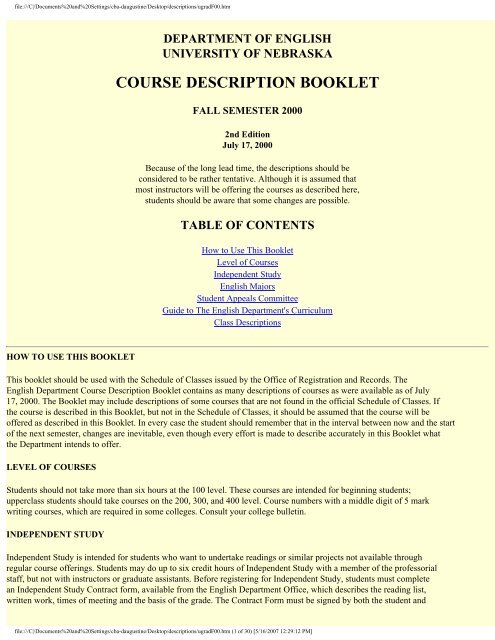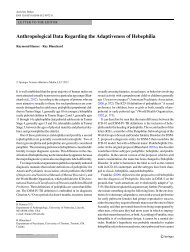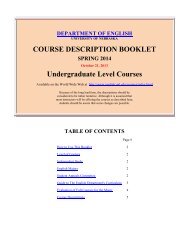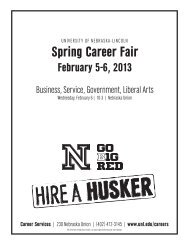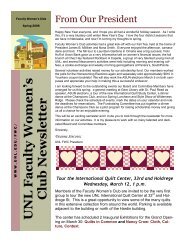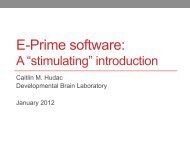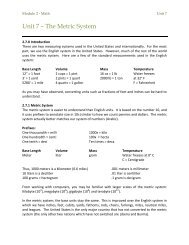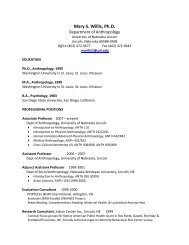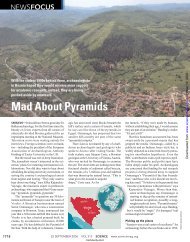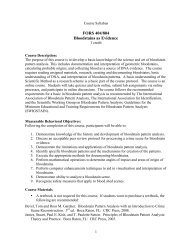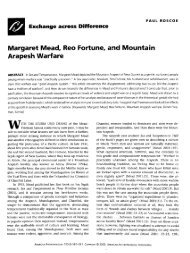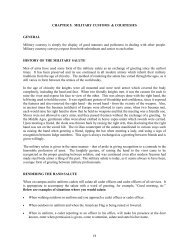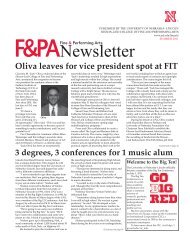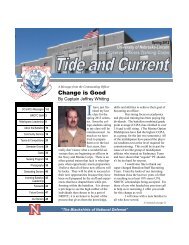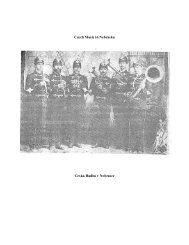Fall 2000 - The University of Nebraska–Lincoln
Fall 2000 - The University of Nebraska–Lincoln
Fall 2000 - The University of Nebraska–Lincoln
Create successful ePaper yourself
Turn your PDF publications into a flip-book with our unique Google optimized e-Paper software.
file:///C|/Documents%20and%20Settings/cba-daugustine/Desktop/descriptions/ugradF00.htm<br />
DEPARTMENT OF ENGLISH<br />
UNIVERSITY OF NEBRASKA<br />
COURSE DESCRIPTION BOOKLET<br />
FALL SEMESTER <strong>2000</strong><br />
2nd Edition<br />
July 17, <strong>2000</strong><br />
Because <strong>of</strong> the long lead time, the descriptions should be<br />
considered to be rather tentative. Although it is assumed that<br />
most instructors will be <strong>of</strong>fering the courses as described here,<br />
students should be aware that some changes are possible.<br />
TABLE OF CONTENTS<br />
How to Use This Booklet<br />
Level <strong>of</strong> Courses<br />
Independent Study<br />
English Majors<br />
Student Appeals Committee<br />
Guide to <strong>The</strong> English Department's Curriculum<br />
Class Descriptions<br />
HOW TO USE THIS BOOKLET<br />
This booklet should be used with the Schedule <strong>of</strong> Classes issued by the Office <strong>of</strong> Registration and Records. <strong>The</strong><br />
English Department Course Description Booklet contains as many descriptions <strong>of</strong> courses as were available as <strong>of</strong> July<br />
17, <strong>2000</strong>. <strong>The</strong> Booklet may include descriptions <strong>of</strong> some courses that are not found in the <strong>of</strong>ficial Schedule <strong>of</strong> Classes. If<br />
the course is described in this Booklet, but not in the Schedule <strong>of</strong> Classes, it should be assumed that the course will be<br />
<strong>of</strong>fered as described in this Booklet. In every case the student should remember that in the interval between now and the start<br />
<strong>of</strong> the next semester, changes are inevitable, even though every effort is made to describe accurately in this Booklet what<br />
the Department intends to <strong>of</strong>fer.<br />
LEVEL OF COURSES<br />
Students should not take more than six hours at the 100 level. <strong>The</strong>se courses are intended for beginning students;<br />
upperclass students should take courses on the 200, 300, and 400 level. Course numbers with a middle digit <strong>of</strong> 5 mark<br />
writing courses, which are required in some colleges. Consult your college bulletin.<br />
INDEPENDENT STUDY<br />
Independent Study is intended for students who want to undertake readings or similar projects not available through<br />
regular course <strong>of</strong>ferings. Students may do up to six credit hours <strong>of</strong> Independent Study with a member <strong>of</strong> the pr<strong>of</strong>essorial<br />
staff, but not with instructors or graduate assistants. Before registering for Independent Study, students must complete<br />
an Independent Study Contract form, available from the English Department Office, which describes the reading list,<br />
written work, times <strong>of</strong> meeting and the basis <strong>of</strong> the grade. <strong>The</strong> Contract Form must be signed by both the student and<br />
file:///C|/Documents%20and%20Settings/cba-daugustine/Desktop/descriptions/ugradF00.htm (1 <strong>of</strong> 30) [5/16/2007 12:29:12 PM]
file:///C|/Documents%20and%20Settings/cba-daugustine/Desktop/descriptions/ugradF00.htm<br />
the supervising pr<strong>of</strong>essor and a copy submitted to the Chief Adviser for department records. <strong>The</strong> student may then obtain<br />
the call number for the appropriate Independent Study course -- 199, 299, 399, 399H, or 497. <strong>The</strong> registration <strong>of</strong> any<br />
student who has not filed the contract with the Chief Adviser by the end <strong>of</strong> Drop/Add period will be canceled.<br />
To Table <strong>of</strong> Contents<br />
ENGLISH MAJORS<br />
All Arts & Sciences College English majors (including double majors) should see their advisers every semester. For<br />
further information see the Chief Adviser, Jacquelynn Sorensen, in Andrews 123A and consult the English<br />
Department's Advising Handbook.<br />
STUDENT APPEALS COMMITTEE<br />
Students wishing to appeal a grade may address their grievances to the Department <strong>of</strong> English Appeals Committee.<br />
Under ordinary circumstances, students should discuss problems with their teachers before approaching the<br />
Committee. Committee Chair is Franz Blaha, 335 Andrews.<br />
Students may inform the Chair <strong>of</strong> the Department, Andrews 204A, <strong>of</strong> cases where the content <strong>of</strong> courses materially differs<br />
from the description printed in the Course Description Booklet. Questions or complaints concerning teachers or courses<br />
should also be addressed to the Chair <strong>of</strong> the Department.<br />
<strong>The</strong> <strong>University</strong> <strong>of</strong> Nebraska-Lincoln, an Affirmative Action/Equal Opportunity Employer, supports equal<br />
educational opportunity and <strong>of</strong>fers the courses listed herein without regard to race, color, sex, religion, national origin,<br />
age, disability, marital status, sexual orientation, or political affiliation. Complaints, comments, or suggestions<br />
about Affirmative Action/Equal Opportunity matters should be addressed to the Chair <strong>of</strong> the Department.<br />
To Table <strong>of</strong> Contents<br />
GUIDE TO THE ENGLISH DEPARTMENT'S CURRICULUM<br />
<strong>The</strong> English Department <strong>of</strong>fers a great many courses, more than are listed by title in the <strong>University</strong> Bulletin. <strong>The</strong>se<br />
include courses in British and American literature, women's literature, other literatures in English, some literatures<br />
in translation, minority literatures, composition, creative writing, linguistics, film, popular literature, and English as a<br />
Second Language.<br />
Knowing something about the organization <strong>of</strong> the curriculum may help majors or non-majors who are trying to find<br />
courses. <strong>The</strong> numbering system provides some guidance, first by levels:<br />
Courses numbered from 100 to 151 are first-year composition courses.<br />
English 180 and 200-level courses are considered entry-level courses, for majors and non-majors alike.<br />
300-level courses are historical surveys <strong>of</strong> literature, advanced author courses, or advanced writing or rhetoric or<br />
linguistics courses.<br />
4/800-level courses are combined senior/graduate classes and are more pr<strong>of</strong>essional in their approach.<br />
<strong>The</strong> numbering system provides additional guidance to types <strong>of</strong> courses. For example, middle-digit 5 courses, like 150,<br />
252, 354, are all writing courses, including creative writing. Here is a quick guide to the numbering system:<br />
A middle digit <strong>of</strong> "0" indicates courses in types <strong>of</strong> literature, such as short story (303), poetry (202), drama (4/801), or<br />
fiction (205), and popular fiction (206A, 206B).<br />
A middle digit <strong>of</strong> "1" indicates special thematic courses or courses examining literature in relation to particular issues<br />
file:///C|/Documents%20and%20Settings/cba-daugustine/Desktop/descriptions/ugradF00.htm (2 <strong>of</strong> 30) [5/16/2007 12:29:12 PM]
file:///C|/Documents%20and%20Settings/cba-daugustine/Desktop/descriptions/ugradF00.htm<br />
(several women's literature courses, Plains Literature, Literature <strong>of</strong> War and Peace, for example).<br />
A middle digit <strong>of</strong> "2" indicates language and linguistics courses.<br />
A middle digit <strong>of</strong> "3" indicates courses focusing on authors (Shakespeare, <strong>The</strong> Brontes, Major American Authors).<br />
A middle digit <strong>of</strong> "4" indicates ethnic minority courses, courses in translation, and courses that represent literature written<br />
in English in countries other than the U.S. and Britain (Judeo-Christian Literature, Canadian Literature, African-<br />
American Literature, for example).<br />
A middle digit <strong>of</strong> "5" indicates creative writing or composition courses.<br />
A middle digit <strong>of</strong> "6" indicates a historical survey <strong>of</strong> literature.<br />
A middle digit <strong>of</strong> "7" indicates courses in criticism, theory, rhetoric (Literary <strong>The</strong>ory, Film <strong>The</strong>ory and Criticism).<br />
A middle digit <strong>of</strong> "8" indicates interdisciplinary courses (Introduction to Comparative Literature).<br />
A middle digit <strong>of</strong> "9" indicates special and pr<strong>of</strong>essional courses (English as a Second Language).<br />
Note: Film courses are spread throughout the numbering system, by analogy with literature courses. Thus Writing for Film<br />
and TV is numbered 259; Film Directors, 233; and so on. Women's literature courses are beginning to be spread out in a<br />
similar fashion. <strong>The</strong>re are also some anomalies in the numbering system, but it provides a useful guide.<br />
<strong>The</strong> practical lesson from this numbering system is that if you find one course that interests you, you may be able to find<br />
others by looking for similar numbers at different levels. As may be clear from these examples, there is a lot <strong>of</strong> repetition in<br />
the English Department curriculum. (Anyone interested in a list <strong>of</strong> English courses by categories can obtain one from the<br />
Chief Advisor in 123 Andrews Hall.)<br />
To Table <strong>of</strong> Contents<br />
CLASS DESCRIPTIONS<br />
Freshman English 230A Shakespeare 353 Advanced Poetry Writing<br />
101 Composition & Literature I 230H Shakespeare<br />
354 Advanced Composition<br />
"Honors Shakespeare"<br />
101A Composition & Literature I<br />
"African American Literature"<br />
233B Major American Authors<br />
"Hawthorne, Melville, Dickinson"<br />
361A Intro to Early American<br />
Literature<br />
101B Composition & Literature I<br />
"Chicano Literature"<br />
101D Composition & Literature I<br />
"Native American Literature"<br />
101H Honors Composition &<br />
Literature I<br />
239 Film Directors<br />
"Gay/Lesbian Filmmakers"<br />
361B<br />
Intro to Late American<br />
Literature<br />
240A World <strong>of</strong> Classical Greece 363 Intro to Renaissance Literature<br />
244E Early African American Literature 365 19th Century British Literature<br />
245D Chicano Literature 4/805G/C American Novel to Dreiser<br />
150 Composition I 245J Jewish-American Fiction 4/811B Plains Literature<br />
150H Honors Composition I 245N Native American Women Writers 4/813 Film<br />
"Transgressive Identity <strong>The</strong>ory"<br />
151 Composition II 252/C Writing <strong>of</strong> Fiction 4/814B 20th Century Women Writers<br />
"Lesbian Writers"<br />
151H Honors Composition II 253/C Writing <strong>of</strong> Poetry 4/820/C Intro to Linguistics<br />
file:///C|/Documents%20and%20Settings/cba-daugustine/Desktop/descriptions/ugradF00.htm (3 <strong>of</strong> 30) [5/16/2007 12:29:12 PM]
file:///C|/Documents%20and%20Settings/cba-daugustine/Desktop/descriptions/ugradF00.htm<br />
180 Introduction to Literature 254 Composition 4/827D Intro to 1st & 2nd Language<br />
186,<br />
187,<br />
188<br />
English as a Second Language 261E American Literary Works 4/830A Shakespeare I<br />
200 Intro to English Studies 270 Literary/Critical <strong>The</strong>ory 4/840 Classical Drama<br />
205/<br />
C<br />
20th Century Fiction 305A Novel 1700-1900 452 Advanced Fiction Writing<br />
210I Illness & Health in Literature 315B Women in Popular Culture 4/853 Writing <strong>of</strong> Poetry<br />
"Advanced Poetry Writing"<br />
210T Stories & Human Experience 322A Modern English Grammar 457 Composition <strong>The</strong>ory & Practice<br />
211A Plains Literature 330E Chaucer, Shakespeare, Milton 4/865 19th Century British Literature<br />
213E Intro to Film History 331 British Authors since 1800 4/871 Literary Criticism<br />
"Jane Austen"<br />
215E Intro to Women's Literature 333B/C Fitzgerald & Hemingway 476 Reading <strong>The</strong>ory & Practice<br />
220 Intro to Linguistic Principles 341 Judeo-Christian Literature 4/898 Spec Topics in English Lit<br />
"Medieval Literature &<br />
<strong>The</strong>ology"<br />
230 English Authors to 1800 352 Advanced Fiction Writing<br />
To Table <strong>of</strong> Contents<br />
Freshman English<br />
NOTE: 100-LEVEL ENGLISH COURSES WILL BE OPEN ONLY TO FRESHMAN AND SOPHOMORE<br />
STUDENTS. Students in Arts and Sciences who have not completed the Communication requirement and have 65 credit<br />
hours or more must choose English 254 or 354 (or both) to complete this requirement. (In unusual cases, exceptions to this<br />
rule may be granted by the Chief Advisor, English Department.) Advanced students in other Colleges who want or need<br />
a composition course should also choose 254 or 354.<br />
English 101 and 102, including ethnic and honors variations, English 150, and English 151 are freshman English<br />
composition courses, designed to help students improve their writing by study and practice. Since reading and writing<br />
are closely related, several <strong>of</strong> the courses involve reading. Although the courses vary some in the amount <strong>of</strong> writing required<br />
as a minimum, students can expect to do a substantial amount <strong>of</strong> writing, some formal, some informal, some done in class<br />
and some at home. Ordinarily students take 100-level courses in the first year.<br />
Students registered in the College <strong>of</strong> Arts & Sciences are required to take any two <strong>of</strong> the following courses. Students in<br />
other colleges should check their college's bulletin or with an adviser, since different colleges have different requirements.<br />
NOTE: ENGLISH 101 AND 102, INCLUDING ETHNIC AND HONORS VARIATIONS, ARE SELF-<br />
CONTAINED COURSES, AND IT IS NOT NECESSARY TO TAKE THEM IN SEQUENCE.<br />
English 101 - Composition & Literature I (<strong>Fall</strong>)<br />
English 102 - Composition & Literature II (Spring)<br />
<strong>The</strong>se are first-year English composition courses. English 101 combines writing with the reading <strong>of</strong> shorter types <strong>of</strong> literature<br />
-- poems, short stories, and essays. English 102 combines writing with the reading <strong>of</strong> longer types <strong>of</strong> literature -- novels,<br />
plays, and narrative poetry. Students in both courses can expect to write at least 7500 words during the semester. <strong>The</strong> kinds<br />
<strong>of</strong> writing may vary some from section to section, though most students can expect to write a number <strong>of</strong> formal papers, as<br />
well as some less formal ones, including perhaps in-class exercises and journals. <strong>The</strong>se courses assume that reading and<br />
file:///C|/Documents%20and%20Settings/cba-daugustine/Desktop/descriptions/ugradF00.htm (4 <strong>of</strong> 30) [5/16/2007 12:29:12 PM]
file:///C|/Documents%20and%20Settings/cba-daugustine/Desktop/descriptions/ugradF00.htm<br />
writing well are closely connected, and they are recommended for students who wish to improve their reading skills<br />
through the study <strong>of</strong> literature.<br />
English 101A - Composition & Literature I - "African American Literature" (<strong>Fall</strong>)<br />
English 102A - Composition & Literature II - "African American Literature" (Spring)<br />
Each <strong>of</strong> these courses is identical to its counterpart above -- English 101 or 102 -- in the expectations concerning the<br />
amount and nature <strong>of</strong> writing and reading, except that all <strong>of</strong> the material to be read will be by or about African-Americans.<br />
English 101B - Composition & Literature I - "Chicano Literature" (<strong>Fall</strong>)<br />
English 102B - Composition & Literature II - "Chicano Literature" (Spring)<br />
Each <strong>of</strong> these courses is identical to its counterpart above -- English 101 or 102 -- in the expectations concerning the<br />
amount and nature <strong>of</strong> writing and reading, except that all <strong>of</strong> the material to be read will be by or about Mexican-Americans.<br />
English 101D - Composition & Literature I - "Native American Literature" (<strong>Fall</strong>)<br />
English 102D - Composition & Literature II - "Native American Literature" (Spring)<br />
Each <strong>of</strong> these courses is identical to its counterpart above -- English 101 or 102 -- in the expectations concerning the<br />
amount and nature <strong>of</strong> writing and reading, except that all <strong>of</strong> the material to be read will be by or about Native Americans.<br />
English 101H - Honors Composition & Literature I (<strong>Fall</strong>)<br />
English 102H - Honors Composition & Literature II (Spring)<br />
NOTE: <strong>The</strong>se courses are intended for students who have demonstrated unusual ability in previous English classes.<br />
Admission is by invitation or application only. See the Department <strong>of</strong> English Chief Adviser, Jacquelynn Sorensen,<br />
Andrews 123A, for more information.<br />
Each course closely resembles its counterpart above -- English 101 or 102.<br />
To Table <strong>of</strong> Contents To Class Description List<br />
English 150 - Composition I<br />
This is a first-year English composition course that concentrates on the study and practice <strong>of</strong> writing. <strong>The</strong> course is intended<br />
to help students develop ways <strong>of</strong> using writing that will serve them in the university and in their lives; to help them<br />
see connections among language activities, writing, speaking, reading, listening; to help them become more aware <strong>of</strong> how<br />
they and others use language. English 150 emphasizes writing and speaking on issues about which the individual knows a<br />
great deal, beginning with issues related to family, friends, organizations, university, or local communities.<br />
English 150H - Honors Composition I<br />
NOTE: This course is intended for students who have demonstrated unusual ability in previous English classes. Admission<br />
is by invitation or application only. See the Department <strong>of</strong> English Adviser, Jacquelynn Sorensen, Andrews 123A, for<br />
more information.<br />
This course resembles closely English 150 (above).<br />
file:///C|/Documents%20and%20Settings/cba-daugustine/Desktop/descriptions/ugradF00.htm (5 <strong>of</strong> 30) [5/16/2007 12:29:12 PM]
file:///C|/Documents%20and%20Settings/cba-daugustine/Desktop/descriptions/ugradF00.htm<br />
English 151 - Composition II<br />
This course shares the same aims as English 150 but emphasizes uses <strong>of</strong> language less close to the individual, more global<br />
than local. <strong>The</strong> course stresses writing and speaking on issues interesting to the individual, but about which he or she may<br />
need to know more, including ideas and issues <strong>of</strong> regional, national, or global scope. English 150 and 151 do not need to<br />
be taken in sequence.<br />
English 151H - Honors Composition II<br />
NOTE: This course is intended for students who have demonstrated unusual ability in previous English classes. Admission<br />
is by invitation or application only. See the Department <strong>of</strong> English Adviser, Jacquelynn Sorensen, Andrews 123A, for<br />
more information.<br />
This course resembles closely English 151 (above).<br />
English 180 - Introduction to Literature<br />
NOTE: This course does not fulfill any part <strong>of</strong> the freshman composition requirement in the College <strong>of</strong> Arts and Sciences.<br />
This course is intended to introduce first and second-year students to examination <strong>of</strong> reading, especially the reading<br />
<strong>of</strong> literature. In order to examine the process <strong>of</strong> reading, students can expect to explore literary works (poems, stories,<br />
essays, and drama), some works not usually considered literary, and the students' own reading practices. <strong>The</strong> course will<br />
deal with such questions as how do we read, why do we read, and what is literature and what are its functions.<br />
To Table <strong>of</strong> Contents To Class Description List<br />
English 186 - English as a Second Language/Language Skills (3 credits)<br />
English 187 - English as a Second Language/Introduction to Writing (3 credits)<br />
English 188 - English as a Second Language/Advanced Communication Skills (3 credits)<br />
NOTE: Admission to these courses is by placement examination required <strong>of</strong> all newly admitted non-native speakers. See<br />
the Coordinator <strong>of</strong> ESL Program, Michael Harpending, Andrews 309.1, for more information.<br />
English 188 applies to the composition requirement in Arts and Sciences, and in some other colleges.<br />
Engl 200--Intro to English Studies<br />
Time Days Sec. Instructor Call#<br />
1030a-1120a MWF 030 Gallagher 7961<br />
Aim: This course introduces students to the reading, writing, and thinking practices that characterize the study <strong>of</strong> English in<br />
the university. At the heart <strong>of</strong> the course are questions such as the following: What is English? What (and whose)<br />
purposes does it serve? How can we best articulate the relationships between and among writers, texts, readers, and<br />
contexts? What is the nature <strong>of</strong> authorship? What is the nature <strong>of</strong> textual meaning? In an effort to address these questions,<br />
we will explore the curriculum and the courses in it; try out a range <strong>of</strong> ways that people in English study and produce texts;<br />
and explore a variety <strong>of</strong> texts, including "literary" and "nonliterary," fiction and nonfiction, and pr<strong>of</strong>essional- and<br />
file:///C|/Documents%20and%20Settings/cba-daugustine/Desktop/descriptions/ugradF00.htm (6 <strong>of</strong> 30) [5/16/2007 12:29:12 PM]
file:///C|/Documents%20and%20Settings/cba-daugustine/Desktop/descriptions/ugradF00.htm<br />
student-generated.<br />
Teaching Method: Discussion (some student-led), group work, collaborative projects, presentations (by instructor<br />
and students).<br />
Requirements: Participation; weekly reading and writing; four or five writing projects, at least one including<br />
significant research; group projects.<br />
Tentative Reading List: <strong>The</strong> readings for this course will be diverse in terms <strong>of</strong> both culture and genre. We will read all<br />
kinds <strong>of</strong> texts, chosen for the diverse reading, interpreting, and writing experiences they invite. Readings may<br />
include Rottenberg's Elements <strong>of</strong> Argument; O'Brien's <strong>The</strong> Things <strong>The</strong>y Carried; Conrad's <strong>The</strong> Heart <strong>of</strong> Darkness;<br />
Whitman's Leaves <strong>of</strong> Grass; Wilson's <strong>The</strong> Piano Lesson; and UNL's own Plains Song Review.<br />
To Table <strong>of</strong> Contents To Class Description List<br />
Engl 205 & 205C--20th Century Fiction<br />
Time Days Sec. Instructor Call#<br />
0830a-0920a MWF 010 Jewell, J. 3717<br />
1030a-1120a MWF 030 Spencer 3719<br />
1100a-1215p TR 035 Caramagno 3720<br />
1130a-1220p MWF 040 Staff 3721<br />
0200p-0315p TR 065 Caramagno 3723<br />
0630p-0920p T 101(C) Staff ****<br />
****To register, contact DCS (472-2175)<br />
010 - Jewell, J<br />
(Further information unavailable at this time.)<br />
030 - Spencer<br />
(Further information unavailable at this time.)<br />
040, 101 - Staff<br />
(Further information unavailable at this time.)<br />
035, 065 - Caramagno<br />
Aim: Novels are historical documents that testify about what is going on in the real world--in science, history, art,<br />
psychology, and philosophy. Like all other fields <strong>of</strong> knowledge you are studying here at the university, novels contribute<br />
to intellectual history. This course is cross-disciplinary, designed to intersect with various majors. It not only<br />
introduces students to six important novelists <strong>of</strong> the 20th century; it helps us see how their fiction expresses the social,<br />
cultural, philosophical, and psychological issues <strong>of</strong> 20th century life.<br />
Requirements: Quizzes on lecture material and readings, a final exam on the last book only, and a five-page essay that<br />
analyzes any work (your choice) for its modern or postmodern characteristics (message, technique).<br />
Tentative Reading List: E.M. Forster, Room with a View; Virginia Woolf, Mrs. Dalloway; Joseph Heller, Catch-22;<br />
Douglas Adams, <strong>The</strong> Hitchhiker's Guide to the Galaxy; Jeanette Winterson, Oranges Are Not the Only Fruit, John Barth,<br />
file:///C|/Documents%20and%20Settings/cba-daugustine/Desktop/descriptions/ugradF00.htm (7 <strong>of</strong> 30) [5/16/2007 12:29:12 PM]
file:///C|/Documents%20and%20Settings/cba-daugustine/Desktop/descriptions/ugradF00.htm<br />
Lost in the Funhouse.<br />
To Table <strong>of</strong> Contents To Class Description List<br />
Engl 210I--Illness & Health in Literature<br />
Time Days Sec. Instructor Call#<br />
0930a-1020a MWF 020 Brookes 7962<br />
Aim: This course is about the ways in which novelists, poets, autobiographers, and other story-tellers represent illness<br />
and health. Such texts <strong>of</strong>fer ways <strong>of</strong> understanding how we experience, think about, and deal with illness in ourselves or<br />
in others. We will look at illness, aging, disability, and health from the point <strong>of</strong> view <strong>of</strong> patients, doctors, nurses, caregivers,<br />
friends, family, strangers (both healthy and not), and society. <strong>The</strong> course should be <strong>of</strong> special interest to<br />
students thinking about careers in health or to anyone else interested in human experience. <strong>The</strong> literature itself creates a<br />
world beyond illness and so may appeal to any reader, though, yes, not all the stories have happy endings.<br />
Teaching Method: Discussion, some informal lectures or mini-lessons, some group work.<br />
Requirements: Frequent short informal response papers; several formal papers; midterm and final essay exams.<br />
Tentative Reading List: Bobbie Ann Mason, Spence and Lila; Reynolds Price, A Whole New Life; Oliver Sacks, <strong>The</strong> Man<br />
Who Mistook His Wife for a Hat; Kay Redfield Jamison, An Unquiet Mind; Lucy Grealey, Autobiography <strong>of</strong> a Face;<br />
a collection <strong>of</strong> poems; probably works by Verghese, Tolstoy, Tillie Olson, Styron, Carver, and Shapiro.<br />
Engl 210T--Stories & Human Experience<br />
Time Days Sec. Instructor Call#<br />
1100a-1215p TR 035 Staff 3728<br />
To Table <strong>of</strong> Contents To Class Description List<br />
(Further information unavailable at this time.)<br />
Engl 211A--Plains Literature<br />
Time Days Sec. Instructor Call#<br />
0930a-1020a MWF 020 Kaye 8478<br />
1130a-1220p MWF 040 Haller 7991<br />
020 - Kaye<br />
Aim: <strong>The</strong> purpose <strong>of</strong> this course is to introduce people to novels, short stories, non-fiction prose, poetry, and drama set on<br />
the Great Plains. You should expect to do a great deal <strong>of</strong> reading, some <strong>of</strong> it in familiar texts, some unfamiliar. Our focus<br />
will be mostly on works by writers <strong>of</strong> American Indian (or First Nations) or European descent.<br />
Teaching Method: This is primarily a discussion class, with some background lectures by the pr<strong>of</strong>essor, some group work,<br />
and important student presentations.<br />
Requirements: Reading all texts and attending class are the first and most important requirements. Expect to write at least<br />
file:///C|/Documents%20and%20Settings/cba-daugustine/Desktop/descriptions/ugradF00.htm (8 <strong>of</strong> 30) [5/16/2007 12:29:12 PM]
file:///C|/Documents%20and%20Settings/cba-daugustine/Desktop/descriptions/ugradF00.htm<br />
seven reader's notebooks, attend and write up at least two out-<strong>of</strong>-class events, and make a presentation to the class.<br />
Tentative Reading List: We will read a cross-section <strong>of</strong> books from the Great Plains region <strong>of</strong> North America, focusing<br />
mostly on the 20th century. We will include Nebraska authors such as Willa Cather and John Neihardt, Canadians such<br />
as Margaret Laurence and Sinclair Ross, American Indian authors such as James Welch and Louise Erdrich, poets such<br />
as William Stafford, non-fiction writers such as Mary Clearman Blew, and dramatists such as Rex Deverell.<br />
040 - Haller<br />
Aim: This is a course in the literature <strong>of</strong> the Great Plains which tries to represent that literature over time and with attention<br />
to the diversity <strong>of</strong> its peoples. Our object will be to identify the defining features <strong>of</strong> this literature and to assess how the<br />
peculiar history, geography and economics <strong>of</strong> the Plains have created a unique literature. We will assess the effectiveness<br />
<strong>of</strong> this literature in establishing an identity for people <strong>of</strong> the Plains and knowledge <strong>of</strong> its special qualities for those from outside.<br />
Teaching Method: Primarily class discussion based upon study questions and analyses. <strong>The</strong>re will be some slide<br />
presentations, excursions and open sessions for the exchange <strong>of</strong> experiences on the Plains.<br />
Requirements: Three papers. One will involve a close analysis <strong>of</strong> passages, one will take a sociological or geographical<br />
or anthropological look at the literature, and one will be personal and the choice <strong>of</strong> each student. <strong>The</strong>re will be a<br />
midterm evaluation and a take-home final examination.<br />
Tentative Reading List: Readings from the following: Wister, <strong>The</strong> Virginian; Roolvaag, Giants in the Earth; Cather,<br />
O Pioneers; Roger Welsh, Omaha Myths; McMurtry, Leaving Cheyenne; James Welsh, Winter in the Blood;<br />
Margaret Laurence, A Bird in the House; Mari Sandoz, Sandhills Sundays; Frank Baum, <strong>The</strong> Wizard <strong>of</strong> Oz; William Least<br />
Heat Moon, PrairyErthe. A packet containing Lewis and Clark journals, original reports <strong>of</strong> explorations. Narratives <strong>of</strong><br />
Indian captivity. Speeches <strong>of</strong> Standing Bear, W.J. Bryan; Sermons, Chautauqua presentations. Charles L. Woodard, ed, As<br />
Far as I Can See. Contemporary Writing <strong>of</strong> the Middle Plains. Windflower Press, 1989.<br />
To Table <strong>of</strong> Contents To Class Description List<br />
Engl 213E--Intro to Film History<br />
Time Days Sec. Instructor Call#<br />
0930a-1045a MW 001 Dixon 3729<br />
1100a-1215p MW 002 Olney 3730<br />
NOTE: Must be free to view films for English 213E on Tuesdays at 1:00pm at Sheldon or on Tuesdays at 7:00pm at BH 117<br />
or on Wednesdays at 3:00pm at Sheldon. Special fee = $20.00<br />
Aim: An overview <strong>of</strong> film history from 1896 to the present.<br />
001 - Dixon<br />
Teaching Method: Lectures, discussion, papers, group work, screenings with notes.<br />
Requirements: Three papers <strong>of</strong> five pages length each, typed, with works cited in proper MLA format; weekly one-page<br />
in-class writing assignments; assigned readings in the books cited below; regular attendance at all screenings and<br />
lectures; taking notes on all class lectures and screenings; one oral report per semester per student on a film <strong>of</strong> her/his<br />
choice; constructive participation in class.<br />
Tentative Reading List: A Short Guide to Writing About Film (Third Edition) by Timothy Corrigan. New York:<br />
Longman. PAPERBACK ONLY, ISBN #0-321-01110-4; History <strong>of</strong> Film by David Parkinson. New York: Thames<br />
file:///C|/Documents%20and%20Settings/cba-daugustine/Desktop/descriptions/ugradF00.htm (9 <strong>of</strong> 30) [5/16/2007 12:29:12 PM]
file:///C|/Documents%20and%20Settings/cba-daugustine/Desktop/descriptions/ugradF00.htm<br />
and Hudson, 1995, PAPERBACK ONLY, ISBN #0-500-20277-X; <strong>The</strong> American Cinema: Directors and Directions<br />
by Andrew Sarris. New York, Da Capo, 1996 PAPERBACK ONLY, ISBN #0-306-80728-9.<br />
Aim: An overview <strong>of</strong> film history from 1896 to the present.<br />
002 - Olney<br />
Teaching Method: Lectures, discussion, group work, weekly screenings.<br />
Requirements: Three five-page papers, one oral presentation, attendance at lectures and screenings, class participation.<br />
Tentative Reading List: Timothy Corrigan, A Short Guide to Writing About Film (3 rd edition); David Parkinson, History<br />
<strong>of</strong> Film; Andrew Sarris, <strong>The</strong> American Cinema: Directors and Directions.<br />
To Table <strong>of</strong> Contents To Class Description List<br />
Engl 215E--Intro to Women's Literature<br />
Time Days Sec. Instructor Call#<br />
0800a-0915a TR 005 Ritchie 3732<br />
0930a-1045a TR 025 Belasco 3734<br />
1100a-1215p TR 035 Staff 7964<br />
1230p-0145p TR 055 Bhatnagar 3735<br />
005 - Ritchie<br />
Aim: To study a variety <strong>of</strong> women's literature from the past 2,000 years in order to reclaim the knowledge and artistry<br />
<strong>of</strong> women writers that has <strong>of</strong>ten been overlooked or ignored in our educational experiences. We'll read writing by<br />
Chicana, British, Egyptian, Chinese, Caribbean, African American, Native American, and European American women;<br />
we'll read literature by lesbian and heterosexual women, by women with disabilities and by those who are able-bodied, and<br />
by poor women and privileged women. I hope that through our reading, we'll appreciate the differences among<br />
women's experiences, gain new perspective on our own lives and on the goals we hope to achieve in them. We'll also<br />
consider the cultural values and assumptions about literature and about women's lives that have influenced what and<br />
how women have written. In all <strong>of</strong> this we'll practice effective strategies for reading and writing about literature.<br />
Teaching Method: Discussions in small groups and in the full class, in-class writing, oral presentations.<br />
Requirements: Informal response papers, a traditional research project, and an action-research project, oral report, attendance<br />
at women's events.<br />
Tentative Reading List: <strong>The</strong> Norton Anthology <strong>of</strong> Literature by Women; An Anthology <strong>of</strong> Hope: Women's Literature<br />
about Human Rights; Allison, Dorothy. Two or Three Things I Know for Sure; Mernisi, Fatima. Dreams <strong>of</strong> Trespass: Tales <strong>of</strong><br />
a Harem Girlhood; Feinberg, Leslie. Stone Butch Blues; El Saadawi, Nawal. Woman At Point Zero; Adios Barbie or Listen<br />
Up: Voices from the Next Feminist Generation.<br />
(Further information unavailable at this time.)<br />
025 - Belasco<br />
035 - Staff<br />
file:///C|/Documents%20and%20Settings/cba-daugustine/Desktop/descriptions/ugradF00.htm (10 <strong>of</strong> 30) [5/16/2007 12:29:12 PM]
file:///C|/Documents%20and%20Settings/cba-daugustine/Desktop/descriptions/ugradF00.htm<br />
(Further information unavailable at this time.)<br />
055 - Bhatnagar<br />
Aim: Introductory course for undergraduates interested in women's studies and women's literature. Introduces students to<br />
a selection <strong>of</strong> poetry, short fiction, film texts. <strong>The</strong> course is designed to encourage students to reflect on their assumptions<br />
about women's literature.<br />
Teaching Method: Lecture/discussion/group work.<br />
Requirements: Class presentations and/or short writing assignments, pop quizzes, in-class writing, group work.<br />
Tentative Reading List: Norton Anthology <strong>of</strong> Literature by Women, second edition, and Women's Writing in India Vol. II:<br />
<strong>The</strong> 20 th Century, ed. by Susie Tharu and K. Lalita.<br />
To Table <strong>of</strong> Contents To Class Description List<br />
Engl 220--Intro to Linguistic Principles<br />
Time Days Sec. Instructor Call#<br />
1030a-1120a MWF 030 Staff 8480<br />
(Further information unavailable at this time.)<br />
Engl 230--English Authors to 1800<br />
Time Days Sec. Instructor Call#<br />
1030a-1120a MWF 030 Butler 3737<br />
(Further information unavailable at this time.)<br />
Engl 230A--Shakespeare<br />
Time Days Sec. Instructor Call#<br />
0930a-1020a MWF 020 Haller 3738<br />
1030a-1120a MWF 030 Nissé 7965<br />
1100a-1215p TR 035 Cr<strong>of</strong>t 8771<br />
020 - Haller<br />
Aim: We will read eight or nine <strong>of</strong> Shakespeare's plays and one <strong>of</strong> his longer poems (<strong>The</strong> Rape <strong>of</strong> Lucrece). We will<br />
use Shakespeare as the means <strong>of</strong> learning the characteristics <strong>of</strong> dramatic speech and structure, and we will study the qualities<br />
<strong>of</strong> his language and thought which make him one <strong>of</strong> the most respected writers <strong>of</strong> all ages.<br />
Teaching Method: Classes will usually be focused on a passage from a play, presented in class performance or on video or<br />
by means <strong>of</strong> an exercise in class. In each case there will be some general principle which will be the outcome <strong>of</strong> the<br />
file:///C|/Documents%20and%20Settings/cba-daugustine/Desktop/descriptions/ugradF00.htm (11 <strong>of</strong> 30) [5/16/2007 12:29:12 PM]
file:///C|/Documents%20and%20Settings/cba-daugustine/Desktop/descriptions/ugradF00.htm<br />
class period. <strong>The</strong>se principles in turn will serve as the basis for individual student work <strong>of</strong> analysis and interpretation.<br />
Requirements: One background report to the class (5 minutes) and one performance <strong>of</strong> a scene with commentary (15<br />
minutes). Two papers, one a close analysis <strong>of</strong> a scene, the other on a general and comparative topic <strong>of</strong> the student's<br />
choice. Occasional exercises and quizzes. A take-home midterm evaluation and a final exam.<br />
Tentative Reading List: As You Like It; Much Ado About Nothing; <strong>The</strong> Winter's Tale; <strong>The</strong> Tempest; Othello; Richard II;<br />
Henry V; Antony and Cleopatra; King Lear; <strong>The</strong> Rape <strong>of</strong> Lucrece.<br />
To Table <strong>of</strong> Contents To Class Description List<br />
030 - Nissé<br />
(Further information unavailable at this time.)<br />
035 - Cr<strong>of</strong>t<br />
(Further information unavailable at this time.)<br />
Engl 230H--Shakespeare<br />
"Honors Shakespeare"<br />
Time Days Sec. Instructor Call#<br />
1130a-1220p MWF 040 Milliken 8770<br />
Aim: We will study examples <strong>of</strong> all four categories <strong>of</strong> Shakespeare's plays: comedies, histories, tragedies, and romances,<br />
noting how Shakespeare uses nuances <strong>of</strong> drama, performance, poetry, and culture to develop his major themes.<br />
Teaching Method: We will use lecture, discussion, video, and informal performance <strong>of</strong> scenes by students.<br />
Requirements: Frequent quizzes and a final exam. One 5-7 page paper.<br />
Tentative Reading List: Comedies: Much Ado About Nothing; A Midsummer Night's Dream; Twelfth Night. Histories:<br />
Henry IV, part 1; Henry IV, part 2; Henry V. Tragedies: Hamlet, King Lear, Othello. Romance: <strong>The</strong> Tempest.<br />
Engl 233B--Major American Authors<br />
"Hawthorne, Melville, Dickinson"<br />
Time Days Sec. Instructor Call#<br />
1100a-1215p TR 035 Wolf 7966<br />
Aim: <strong>The</strong> course will focus on three major 19 th -century American writers--who they were, how they saw their world, and<br />
what they wrote. Our readings and discussions will from time to time focus on the impact <strong>of</strong> Puritanism on the 19 th -<br />
century imagination, critical views <strong>of</strong> orthodox Christianity, 19 th -century perceptions <strong>of</strong> women, and attitudes toward<br />
social reform.<br />
Teaching Method: Full class discussions; frequent small group discussions; various exercises involving writing,<br />
drawing, reading aloud, recollecting, role playing, dramatizing; student oral reports. We'll be using Moby-Dick as our<br />
central work and as our entrance into the worlds <strong>of</strong> Hawthorne and Dickinson.<br />
Requirements: (1) A statement <strong>of</strong> your aims; (2) active participation in discussions; (3) regular attendance; (4) two 3-4<br />
file:///C|/Documents%20and%20Settings/cba-daugustine/Desktop/descriptions/ugradF00.htm (12 <strong>of</strong> 30) [5/16/2007 12:29:12 PM]
file:///C|/Documents%20and%20Settings/cba-daugustine/Desktop/descriptions/ugradF00.htm<br />
page essays; (5) a research or creative project; (6) an oral report on your research; (7) a final appraisal <strong>of</strong> your work in<br />
the course.<br />
Tentative Reading List: Hawthorne: a selection <strong>of</strong> short stories; <strong>The</strong> Scarlet Letter; <strong>The</strong> Blithdale Romance. Melville:<br />
Moby-Dick; a selection <strong>of</strong> short stories. Dickinson: Complete Poems; Strunk and White, <strong>The</strong> Elements <strong>of</strong> Style.<br />
Engl 239--Film Directors<br />
"Gay/Lesbian Filmmakers"<br />
Time Days Sec. Instructor Call#<br />
0930a-1045a TR 025 Foster 7967<br />
NOTE: Must be free to view films for English 239 on Tuesdays at 3:00pm at Sheldon or Tuesdays at 9:00pm at BH 117 or<br />
on Wednesdays at 1:00pm at Sheldon. Special Fee = $20.00<br />
Aim: We will view and analyze films that feature gay/lesbian/bisexual and transgendered characters. We look at the history<br />
<strong>of</strong> queer identity in film history from films such as <strong>The</strong> Servant to Love and Death on Long Island.<br />
Teaching Method: Class discussions, journals, and in-class screenings, but mostly discussions; oral reports; weekly<br />
film screenings at the Ross Film <strong>The</strong>ater.<br />
Requirements: An analytical engagement with the material, both visual and written texts, is a prerequisite. Weekly<br />
journals, two or three short papers; extensive note-taking at screenings.<br />
Tentative Reading List: <strong>The</strong> Celluloid Closet; Vampires and Violets: Lesbian Representation in the Cinema;<br />
Bisexual Characters in Film.<br />
To Table <strong>of</strong> Contents To Class Description List<br />
Engl 240A--World <strong>of</strong> Classical Greece<br />
(Cross-listed with Classics 281)<br />
Time Days Sec. Instructor Call#<br />
0130p-0220p MWF 001 Adkin 3742<br />
Aim: Some <strong>of</strong> the greatest works <strong>of</strong> Greek literature are read in English translations as an introduction to the world <strong>of</strong><br />
Classical Greece.<br />
Teaching Method: Lectures and discussions.<br />
Requirements: Reading <strong>of</strong> assigned works. Mid-term and final essays, four quizzes, and one presentation make up the grade.<br />
Tentative Reading List: Homer, <strong>The</strong> Iliad (tr. Rieu) (Penguin); Greek Lyrics (tr. Lattimore) (Chicago); Aschylus, Oresteia<br />
(tr. Lattimore) (Chicago); Aeschylus, Prometheus Bound (tr. Anderson) (Library <strong>of</strong> Liberal Arts); Sophocles I, II, (tr.<br />
Greene and Lattimore) (Chicago); Aristophanes, <strong>The</strong> Complete Plays (Tr. Hadas) (Bantam).<br />
Engl 244E--Early African American Literature<br />
Time Days Sec. Instructor Call#<br />
file:///C|/Documents%20and%20Settings/cba-daugustine/Desktop/descriptions/ugradF00.htm (13 <strong>of</strong> 30) [5/16/2007 12:29:12 PM]
file:///C|/Documents%20and%20Settings/cba-daugustine/Desktop/descriptions/ugradF00.htm<br />
0930a-1045a TR 025 Patton 3745<br />
1230p-0145p TR 055 Patton 7968<br />
Aim: This course surveys literary productions by African Americans from the oral tradition and first writings through<br />
the Harlem Renaissance. We will study various genres, including prose, poetry, and drama. <strong>The</strong> course addresses such<br />
topics as: What constitutes African American literature? What is the relationship between the historical context and<br />
literary production?<br />
Teaching Method: <strong>The</strong> class will meet as a discussion group with occasional lectures and small group activities.<br />
Requirements: Attendance, participation, study questions, oral report, two essays, a midterm and a final.<br />
Tentative Reading List: <strong>The</strong> Norton Anthology <strong>of</strong> African American Literature and <strong>The</strong> Marrow <strong>of</strong> Tradition.<br />
To Table <strong>of</strong> Contents To Class Description List<br />
Engl 245D--Chicano Literature<br />
Time Days Sec. Instructor Call#<br />
1030a-1120a MWF 030 Montes 8756<br />
Aim: This course is a survey <strong>of</strong> 19th and 20th-century Chicana/o literature. We will begin with the first California<br />
novelist, writer Maria Amparo Ruiz de Burton, who wrote Who Would Have Thought It? in 1872. We will compare<br />
historical fiction aesthetics by pairing the Ruiz de Burton novel with Alejandro Morales' novel, <strong>The</strong> Brick People. We will<br />
also look at the genre <strong>of</strong> the "testimonio" and then proceed to representative selections from the following genres:<br />
fiction, essay, poetry, theater and musical lyrics. Each author selected will be studied in relation to her/his particular<br />
thematic/formal contribution to the development <strong>of</strong> the tradition as well as in relation to the artistic, ideological,<br />
and institutional affiliations that have made American/Chicana(o) literature possible.<br />
Tentative Reading List: Ruiz de Burton, Maria Amparo. Who Would Have Thought It? Houston: Arte Publico Press,<br />
1995. Morales, Alejandro. <strong>The</strong> Brick People. Houston: Arte Publico Press, 1992. Americo Paredes. George<br />
Washington Gomez: A Mexicotexan Novel. Houston: Arte Publico Press, 1990. Ana Castillo. <strong>The</strong> Mixquiahuala Letters.<br />
New York: Doubleday, 1986. Graciela Limon. <strong>The</strong> Memories <strong>of</strong> Ana Calderon. Houston: Arte Publico Press, 1994. A<br />
reader packet.<br />
Engl 245J--Jewish-American Fiction<br />
Time Days Sec. Instructor Call#<br />
0630p-0920p R 001 Shapiro 7969<br />
Aim: This course will explore a broad sampling <strong>of</strong> the best <strong>of</strong> Jewish-American fiction covering most <strong>of</strong> the 20th century in<br />
a variety <strong>of</strong> forms: novellas, novels, short stories, films, and a two-volume comic strip. Inevitably, as we read and discuss<br />
these works <strong>of</strong> fiction, we'll also explore the culture that produced them, and deepen our understanding <strong>of</strong> the conflicts<br />
and concerns that distinguish that culture. For those who already know something (or a great deal) about Judaism and<br />
Jewish-American life, the course will, I hope, <strong>of</strong>fer new insights and pleasures. For those whose knowledge <strong>of</strong> Jewish life<br />
is more limited, I hope the work <strong>of</strong> this course will provide an opportunity to become acquainted with a complex,<br />
fascinating, vital and vibrant culture.<br />
Teaching Method: Discussion, occasional short lectures.<br />
Requirements: Weekly reading journals in response to assigned texts; faithful attendance and active<br />
participation; miscellaneous bits <strong>of</strong> writing (statement <strong>of</strong> goals, response to the syllabus, end-<strong>of</strong>-semester evaluation).<br />
file:///C|/Documents%20and%20Settings/cba-daugustine/Desktop/descriptions/ugradF00.htm (14 <strong>of</strong> 30) [5/16/2007 12:29:12 PM]
file:///C|/Documents%20and%20Settings/cba-daugustine/Desktop/descriptions/ugradF00.htm<br />
Tentative Reading List: Works by Sholem Aleichem, I.L. Peretz, Art Spiegelman, Cynthia Ozick, Grace Paley, Saul<br />
Bellow, Bernard Malamud, Elinor Lipman, Joseph Skibell, Philip Roth, Isaac Bashevis Singer, Tillie Olsen, Lev<br />
Raphael, Anzia Yezierska, Francine Prose, and Allegra Goodman, among others.<br />
To Table <strong>of</strong> Contents To Class Description List<br />
Engl 245N--Native American Women Writers<br />
Time Days Sec. Instructor Call#<br />
1230p-0145p TR 055 Powell 7956<br />
Aim: To gain a critical understanding <strong>of</strong> American Indian women's writings across a range <strong>of</strong> genres.<br />
Teaching Method: Instructor- and participant- led discussion.<br />
Requirements: Previous coursework that addresses race/ethnicity/gender issues will be helpful for the success <strong>of</strong><br />
course participants but is not required. Each participant will be responsible for keeping a critical response journal with<br />
weekly entries, plus there will be a midterm paper and a final project (including proposal and bibliography).<br />
Tentative Reading List: We will read both historical and contemporary texts in a wide range <strong>of</strong> genres--autobiography,<br />
poetry, fiction, critical theory, non-fiction, etc. <strong>The</strong> final reading selections will probably include Sarah Winnemucca<br />
Hopkins, Alice Callahan, Zitkala-Sa, Leslie Silko, Susan Power, Winona LaDuke, Joy Harjo, Wendy Rose, Maria<br />
Campbell, Jeanette Armstrong, and others.<br />
Engl 252 & 252C--Writing <strong>of</strong> Fiction<br />
Time Days Sec. Instructor Call#<br />
0830a-0920a MWF 010 Staff 3749<br />
0930a-1045a TR 025 Shapiro 3750<br />
1100a-1215p TR 035 Slater 3751<br />
0200p-0315p TR 065 Vivian 3752<br />
0630p-0920p W 102 Staff 3753<br />
0630p-0920p W 141(C) Staff ****<br />
****To register, contact DCS (472-2175).<br />
010, 102, 141 - Staff(Further information unavailable at this time.)<br />
025 - Shapiro<br />
(Further information unavailable at this time.)<br />
065 - Vivian<br />
(Further information unavailable at this time.)<br />
035 - Slater<br />
Aim: This is an introductory course in the craft <strong>of</strong> fiction writing, aimed at helping you become an accomplished writer<br />
file:///C|/Documents%20and%20Settings/cba-daugustine/Desktop/descriptions/ugradF00.htm (15 <strong>of</strong> 30) [5/16/2007 12:29:12 PM]
file:///C|/Documents%20and%20Settings/cba-daugustine/Desktop/descriptions/ugradF00.htm<br />
and reader <strong>of</strong> fiction. We will practice a variety <strong>of</strong> fictional techniques--creating vivid characters, building a scene,<br />
writing effective dialogue, avoiding plot cliches, etc.--and we will read a lot <strong>of</strong> good published fiction and use it as models<br />
for our own work.<br />
Teaching Method: A combination <strong>of</strong> activities: in-class writing, small group work, individual story conference with<br />
instructor, and whole-class discussion.<br />
Requirements: (1) two stories (8-15 pages each), extensively revised and polished into final-draft form; (2) occasional<br />
quizzes on the assigned text; (3) a number <strong>of</strong> creative exercises aimed at developing technique; (4) detailed written critiques<br />
<strong>of</strong> classmates' stories; (5) faithful attendance and active participation.<br />
Tentative Reading List: Scribner Anthology <strong>of</strong> Contemporary Short Fiction<br />
To Table <strong>of</strong> Contents To Class Description List<br />
Engl 253 & 253C--Writing <strong>of</strong> Poetry<br />
Time Days Sec. Instructor Call#<br />
0930a-1045a TR 025 Staff 3755<br />
1100a-1215p TR 035 Kuzma 3756<br />
1230p-0145p TR 055 Staff 3757<br />
1230p-0145p TR 056 Kuzma 3758<br />
0630p-0920p M 201 Raz 3760<br />
0630p-0920p M 141(C) Raz ****<br />
****To register, contact DCS (472-2175).<br />
025, 055 - Staff(Further information unavailable at this time.)<br />
035, 056 - Kuzma<br />
Aim: To learn to write better poems and to learn to give close attention to other poets in the class.<br />
Teaching Method: Readings, lecture, discussion primarily; some group work.<br />
Requirements: Report on a poetry reading, book report over a recent book <strong>of</strong> poems, all written exercises, paper over<br />
class poems.<br />
Tentative Reading List: We will work from student poems.<br />
141, 201 - Raz<br />
Aim: To write and discuss our own poems and to read poetry by contemporary poets as models and context for our work.<br />
Teaching Method: Workshop/discussion/presentations.<br />
Requirements: To attend class, write poems, and read poems for discussion. One 20-minute oral report to the class on a<br />
living poet <strong>of</strong> your choice, a written essay based on your presentation, and 12 original and finished poems are<br />
required. Keeping journals and class response also are required.<br />
Tentative Reading List: Issue(s) <strong>of</strong> the literary quarterly Prairie Schooner; Mary Oliver, A Poetry Handbook;<br />
Introspections: American Poets on One <strong>of</strong> <strong>The</strong>ir Own Poems, ed. Robert Pack and Jay Parini, U. Press <strong>of</strong> New<br />
file:///C|/Documents%20and%20Settings/cba-daugustine/Desktop/descriptions/ugradF00.htm (16 <strong>of</strong> 30) [5/16/2007 12:29:12 PM]
file:///C|/Documents%20and%20Settings/cba-daugustine/Desktop/descriptions/ugradF00.htm<br />
England; handouts; more. Some <strong>of</strong> the poets we'll read are Mark Doty, Rita Dove, Stephen Dunn, Rosellen Brown,<br />
Marvin Bell, A. R. Ammons, Julia Alvarez, Robert Pinsky, Maxine Kumin, Mark Strand, Erica Jong, Dave Smith and others.<br />
To Table <strong>of</strong> Contents To Class Description List<br />
Engl 254--Composition<br />
Time Days Sec. Instructor Call#<br />
0800a-0915a TR 005 Staff 3761<br />
0830a-0920a MWF 010 Staff 3762<br />
0930a-1020a MWF 020 Staff 3763<br />
0930a-1045a TR 025 Staff 3765<br />
1030a-1120a MWF 030 Staff 3766<br />
1100a-1215p TR 035 Vivian 3768<br />
1130a-1220p MWF 040 Staff 3769<br />
1230p-0120p MWF 050 Staff 3770<br />
1230p-0145p TR 055 Staff 3772<br />
0130p-0220p MWF 060 Staff 3773<br />
0200p-0315p TR 065 Staff 3774<br />
0230p-0320p MWF 070 Staff 3775<br />
Staff(Further information unavailable at this time.)<br />
Vivian - 035<br />
(Further information unavailable at this time.)<br />
To Table <strong>of</strong> Contents To Class Description List<br />
Engl 261E--American Literary Works<br />
Time Days Sec. Instructor Call#<br />
0930a-1045a TR 025 Blaha 3777<br />
Aim: To enhance students' skills in close critical reading and literary analysis. To establish a thorough understanding <strong>of</strong><br />
each text in terms <strong>of</strong> character, theme, structure, and style. We will read a range <strong>of</strong> poetry and fiction from the late 19th<br />
and 20th centuries. Various subjects such as relations between North and South and social organization will be<br />
recurrent throughout the course. Students will be encouraged to think about the relationship between literature and society<br />
by considering the wider implications <strong>of</strong> literary form and textual detail.<br />
Teaching Method: Classroom discussion will be the primary teaching method. Some introductory lectures will be given,<br />
and group presentations will be included. Vigorous and engaged classroom participation is essential.<br />
Requirements: Three 3-4 page papers; midterm exam; final exam; regular unannounced quizzes. You will also be required<br />
to read all assignments and attend class regularly and punctually.<br />
file:///C|/Documents%20and%20Settings/cba-daugustine/Desktop/descriptions/ugradF00.htm (17 <strong>of</strong> 30) [5/16/2007 12:29:12 PM]
file:///C|/Documents%20and%20Settings/cba-daugustine/Desktop/descriptions/ugradF00.htm<br />
Tentative Reading List: Kate Chopin, <strong>The</strong> Awakening; Stephen Crane, <strong>The</strong> Red Badge <strong>of</strong> Courage; Toni Morrison, Tar<br />
Baby; Mark Twain, Huckleberry Finn; B. Franklin, Autobiography; <strong>The</strong> Autobiography <strong>of</strong> Frederick Douglass; Fitzgerald,<br />
<strong>The</strong> GreatGatsby; Miller, Death <strong>of</strong> a Salesman.<br />
Engl 270--Literary/Critical <strong>The</strong>ory<br />
Time Days Sec. Instructor Call#<br />
1130a-1220p MWF 040 Spencer 7970<br />
Aim: To understand the role <strong>of</strong> literary theory in English studies and to appreciate how literary theory can be used to<br />
produce meaningful interpretations <strong>of</strong> literary works. We will start the semester by defining literary and critical theory.<br />
<strong>The</strong>n we will read about and discuss how and why literary theory has become an important part <strong>of</strong> English studies. Next,<br />
we will learn about three different types <strong>of</strong> literary theory--New Criticism, Marxist criticism and psychoanalytic criticism--<br />
and apply each <strong>of</strong> these theories to three classic literary works--Hamlet by William Shakespeare, Frankenstein by<br />
Mary Shelley, and <strong>The</strong> Great Gatsby by F. Scott Fitzgerald. <strong>The</strong> overall purpose <strong>of</strong> the course is to show how<br />
our understanding <strong>of</strong> literary texts is enhanced and enriched by reading such texts with reference to various literary theories.<br />
Teaching Method: Primarily discussion, but also some mini-lectures and student group activities.<br />
Requirements: Three four-page papers. Each student will be required to make an oral presentation to the class. Regular<br />
class participation and punctual attendance are also required.<br />
Tentative Reading List: Hamlet by William Shakespeare, Frankenstein by Mary Shelley, and <strong>The</strong> Great Gatsby by F.<br />
Scott Fitzgerald. Writings on literary and critical theory by I.A. Richards, T.S. Eliot, W.K. Wimsatt, Monroe<br />
Beardsley, Cleanth Brooks, Karl Marx, Friedrich Engels, Georg Lukács, Jean-Paul Sartre, Fredric Jameson, Sigmund<br />
Freud, Gaston Bachelard, Norman Holland, Jacques Lacan, Slavoj Zizek, and others.<br />
Engl 305A--Novel 1700-1900<br />
Time Days Sec. Instructor Call#<br />
0930a-1045a TR 025 Bhatnagar 3779<br />
1100a-1215p TR 035 Bhatnagar 7973<br />
Aim: Introduce English majors/upper level senior undergraduates to the British novel. <strong>The</strong> course is designed to<br />
encourage students to think about the novel form--its origins, its readerly pleasures, realism, social-political criticism<br />
through the novelistic genres, gender and the novel form.<br />
Teaching Method: Lecture/discussion<br />
Requirements: Presentations and/or short writing assignments, pop quizzes, in-class writing, group work.<br />
Tentative Reading List: Richardson, Fielding, Brontë, Shelley, Dickens and some films based on literary classics.<br />
To Table <strong>of</strong> Contents To Class Description List<br />
Engl 315B--Women in Popular Culture<br />
Time Days Sec. Instructor Call#<br />
1100a-1215p TR 025 Staff 3781<br />
1230p-0145p TR 055 Honey 3784<br />
file:///C|/Documents%20and%20Settings/cba-daugustine/Desktop/descriptions/ugradF00.htm (18 <strong>of</strong> 30) [5/16/2007 12:29:12 PM]
file:///C|/Documents%20and%20Settings/cba-daugustine/Desktop/descriptions/ugradF00.htm<br />
025 - Staff<br />
(Further information unavailable at this time.)<br />
055 - Honey<br />
Aim: Students will become familiar with popular materials that have special appeal for a female audience. <strong>The</strong> course<br />
will focus on American culture in the 20th century and will cover a variety <strong>of</strong> media: magazines, novels, film,<br />
television, music. We will examine prominent images <strong>of</strong> and themes about women from varying economic groups,<br />
ethnicities, sexual orientation, and time periods in order to see what messages have been and are being sent out about<br />
women's roles.<br />
Teaching Method: Discussion, some group work. Viewing videotapes will be a prominent part <strong>of</strong> the course as will<br />
discussion <strong>of</strong> popular culture items students bring to class. <strong>The</strong> course will be student oriented in the sense that<br />
student responses to the material will form the core <strong>of</strong> the class activity.<br />
Requirements: Rigorous level <strong>of</strong> attendance and reading preparation for class, two six-page papers, eight 2-page<br />
response papers.<br />
Tentative Reading List: Loving With a Vengeance--Tania Modleski; Reviving Ophelia--Mary Pipher; <strong>The</strong> Feminine<br />
Mystique--Betty Friedan; Black Looks--bell hooks; Kindred--Octavia Butler; a Harlequin romance; a contemporary<br />
women's magazine; selected magazine fiction from the early 20th century; other texts to be determined.<br />
Engl 322A--Modern English Grammar<br />
Time Days Sec. Instructor Call#<br />
0930a-1020a MWF 020 Staff 3785<br />
(Further information unavailable at this time.)<br />
Engl 330E--Chaucer, Shakespeare, Milton<br />
Time Days Sec. Instructor Call#<br />
1230p-0120p MWF 050 Buhler 3787<br />
Aim: This course is designed to increase our familiarity with three major figures <strong>of</strong> English literature: Ge<strong>of</strong>frey<br />
Chaucer, William Shakespeare, and John Milton. We will explore how the media <strong>of</strong> literary production (oral<br />
presentation, manuscripts, public and private stages, print) affected each writer's sense <strong>of</strong> his audience and his craft. We<br />
will also consider these writers in relation to each other; influence and intertextuality are important factors in building<br />
literary communities. Our concerns will include common themes, shared sources, and each author's awareness <strong>of</strong>--<br />
and challenges to--his predecessors.<br />
Teaching Method: Lecture and discussion; multimedia presentations; small-group exercises and performances.<br />
Requirements: Active participation; "reading response" papers; two essays on connections and contrasts between these authors.<br />
Tentative Reading List: Ge<strong>of</strong>frey Chaucer's Troilus and Criseyde and selected Canterbury Tales; William Shakespeare's<br />
A Midsummer Night's Dream, Much Ado About Nothing, and Troilus and Cressida; John Milton's "On<br />
Shakespeare," Areopagitica, "L'Allegro" and "Il Penseroso," A Mask at Ludlow Castle, Lycidas, selections from Paradise Lost.<br />
file:///C|/Documents%20and%20Settings/cba-daugustine/Desktop/descriptions/ugradF00.htm (19 <strong>of</strong> 30) [5/16/2007 12:29:12 PM]
file:///C|/Documents%20and%20Settings/cba-daugustine/Desktop/descriptions/ugradF00.htm<br />
To Table <strong>of</strong> Contents To Class Description List<br />
Engl 331--British Authors since 1800<br />
"Jane Austen"<br />
Time Days Sec. Instructor Call#<br />
0930a-1020a MWF 020 White 8804<br />
Aim: This course will examine the works and times <strong>of</strong> Jane Austen (1775-1816), one <strong>of</strong> the greatest English novelists. We<br />
will read all six novels and some <strong>of</strong> her letters, juvenalia and unfinished work, as well as some secondary critical<br />
material. Austen wrote in the midst <strong>of</strong> the age <strong>of</strong> revolutions and during the full flush <strong>of</strong> English Romanticism; we will<br />
explore her resistences and accommodations to these pressures and others as she negotiates in her novels the place <strong>of</strong><br />
middle-class women in the early 19th century. Our aim will be both inward and outward; that is, we will practice close<br />
reading <strong>of</strong> the novels (and <strong>of</strong> some recent Austen films) while also placing her work in the perspective <strong>of</strong> its<br />
intellectual, literary, and cultural history.<br />
Teaching Method: Some lecture, discussion, and group work.<br />
Requirements: Two papers, one comprehensive final exam, six short quizzes, one group project.<br />
Tentative Reading List: All six novels (Northanger Abbey, Sense and Sensibility, Pride and Prejudice, Mansfield Park,<br />
Emma, and Persuasion), letters, juvenalia, and unfinished work (Sanditon); some secondary criticism.<br />
Engl 333B & 333BC--Fitzgerald & Hemingway<br />
Time Days Sec. Instructor Call#<br />
0630p-0920p T 001 Blaha 3788<br />
0630p-0920p T 141(C) Blaha **** ****To register for section 141, contact DCS (472-2175).<br />
To Table <strong>of</strong> Contents To Class Description List<br />
(Further information unavailable at this time.)<br />
Engl 341--Judeo-Christian Literature<br />
Time Days Sec. Instructor Call#<br />
1100a-1215p TR 020 McShane 3791<br />
Aim: <strong>The</strong> Hebrew and Christian Scriptures form a library. We will read representative books from that library so students<br />
may learn useful skills for making sense out <strong>of</strong> those materials and out <strong>of</strong> other literature that assumes an audience is<br />
familiar with them.<br />
Teaching Method: Lecture, discussion, group work etc.<br />
Requirements: One paper, one exam, regular journals, occasional quizzes.<br />
Tentative Reading List: Genesis, Exodus, Leviticus, Numbers and Deuteronomy; representative historical, prophetical<br />
and wisdom books <strong>of</strong> the Hebrew Scriptures, and representative gospels, epistles, and Revelation<br />
Engl 352--Advanced Fiction Writing<br />
file:///C|/Documents%20and%20Settings/cba-daugustine/Desktop/descriptions/ugradF00.htm (20 <strong>of</strong> 30) [5/16/2007 12:29:12 PM]
file:///C|/Documents%20and%20Settings/cba-daugustine/Desktop/descriptions/ugradF00.htm<br />
Time Days Sec. Instructor Call#<br />
0600p-0900p T 001 Agee 3792<br />
(Further information unavailable at this time.)<br />
Engl 353--Advanced Poetry Writing<br />
Time Days Sec. Instructor Call#<br />
0230p-0450p W 001 King 3794<br />
Aim: Advanced poetry writing is designed for students with some previous experience in writing, reading, discussing,<br />
and revising poetry and who are familiar with the basic concepts and terminology generally covered in English 252 or<br />
other introductions to writing poetry. <strong>The</strong> goal <strong>of</strong> the course is to advance each student's ability and fluency in individual<br />
poetry writing as well as sharpen and broaden his/her abilities in reading, discussing, and reflecting on poetry.<br />
Teaching Method: <strong>The</strong> course is divided into (1) reading, discussing, and writing activities from the text and<br />
instructor, influenced by group discussion, and (2) a "writers' workshop," the reading <strong>of</strong> each other's poetic work<br />
with constructive response and reflection.<br />
Requirements: Drafts/revisions <strong>of</strong> poems throughout the semester (a booklet <strong>of</strong> 10 at the end); participation in<br />
workshop discussion; a writer's notebook kept on a weekly basis at the least; weekly reading assignments from text or<br />
handout; a 3-4 page review <strong>of</strong> a book <strong>of</strong> poems by a contemporary poet <strong>of</strong> your choice.<br />
Tentative Reading List: <strong>The</strong> text, <strong>The</strong> Generation <strong>of</strong> <strong>2000</strong>: Contemporary American Poets, ed. William Heyen,<br />
contains approximately eight poems and a commentary by 31 contemporary poets, so we'll read one or two poets a week<br />
and discuss.<br />
To Table <strong>of</strong> Contents To Class Description List<br />
Engl 354--Advanced Composition<br />
Time Days Sec. Instructor Call#<br />
0930a-1020a MWF 020 Ford 3795<br />
1100a-1215p TR 035 Minter 3796<br />
1130a-1220p MWF 040 Ford 3797<br />
PREQ: 3 hrs Composition at the Engl 200-level or above or permission.<br />
020, 040 - Ford<br />
Aim: This is an advanced composition course which focuses on practical academic and pr<strong>of</strong>essional writing in the<br />
student's major field. <strong>The</strong>refore, the objectives are for each student to develop writing abilities and increase writing<br />
confidence that will serve him or her during the college years and beyond.<br />
Teaching Method: Workshopping, lecture, demonstration, and discussion.<br />
Requirements: Three to five essays, a research project, and an oral presentation.<br />
Tentative Reading List: Student writing, materials found through research.<br />
035 - Minter<br />
file:///C|/Documents%20and%20Settings/cba-daugustine/Desktop/descriptions/ugradF00.htm (21 <strong>of</strong> 30) [5/16/2007 12:29:12 PM]
file:///C|/Documents%20and%20Settings/cba-daugustine/Desktop/descriptions/ugradF00.htm<br />
Aim: This section <strong>of</strong> 354 will focus on nonfiction essays, exploring conventions <strong>of</strong> public and academic argument as well<br />
as experimental forms <strong>of</strong> argument. While some <strong>of</strong> the writing will be "teacher-directed," much <strong>of</strong> the writing will be<br />
"student-directed," requiring students to design and carry out their own nonfiction prose projects. <strong>The</strong> "readings" for this<br />
course will take up two kinds <strong>of</strong> questions: (1) using reading and writing as a means <strong>of</strong> locating one's self among a range<br />
<strong>of</strong> communities and voices; (2) strategies for (and reflections on) the challenges <strong>of</strong> representing one's position in writing.<br />
Teaching Method: Collaborative work, large and small group discussions, writing and reading activities (including<br />
reflection on one's own processes as a writer, reader and learner), conferences, mid- and end-<strong>of</strong>-semester portfolios <strong>of</strong> writing.<br />
Requirements: Four or five writing projects designed by students individually and/or as members <strong>of</strong> groups; weekly<br />
reading and writing; active and consistent participation in whole-class or smaller group discussions, productive work in<br />
smaller peer-response groups. Though the class will meet in the computer classroom, no computer experience is<br />
necessary (though some experience with keyboarding/word-processing will likely prove useful).<br />
Tentative Reading List: While final book selections have not yet been made, students can plan on reading three books and<br />
a few essays, in addition to classmates' writing.<br />
To Table <strong>of</strong> Contents To Class Description List<br />
Engl 361A--Intro to Early American Literature<br />
Time Days Sec. Instructor Call#<br />
0800a-0915a TR 005 Wolf 3798<br />
1230p-0145p TR 055 Price 3802<br />
005 - Wolf<br />
Aim: <strong>The</strong> course is designed to introduce you to a representative selection <strong>of</strong> works from a variety <strong>of</strong> traditions that<br />
constitute American literature from the Colonial Period through the Civil War. <strong>The</strong>se will include works by such<br />
canonical writers as Hawthorne, Emerson, Whitman, Dickinson, and Melville, as well as less known women writers (e.<br />
g. Bradstreet, Fletcher, Fuller) and writers <strong>of</strong> color.<br />
Teaching Method: Discussions based on questions and issues you and I raise; frequent small group discussions;<br />
various exercises involving writing, drawing, reading aloud, recollecting, role playing, dramatizing; student reports.<br />
Requirements: (1) A statement <strong>of</strong> your aims; (2) active participation in discussion; (3) careful, engaged reading <strong>of</strong><br />
assigned works and handouts; (4) regular and punctual attendance; (5) two 3-4 page essays; (6) one 5-10 minute oral<br />
research report; (7) a final self-appraisal <strong>of</strong> your work in the course.<br />
Tentative Reading List: Selections from Lauter, et al., eds., <strong>The</strong> Heath Anthology <strong>of</strong> American Literature, 3 rd ed., Volume<br />
I; Melville, Moby-Dick; Strunk and White, <strong>The</strong> Elements <strong>of</strong> Style.<br />
055 - Price<br />
Aim: This course surveys literary documents from what is now the U.S. and spans the period from Columbus and<br />
Native American oral literature to Dickinson and Whitman. I have several goals: to increase your knowledge <strong>of</strong> this body<br />
<strong>of</strong> literature and its historical context, to sharpen your analytical ability, and to improve your writing.<br />
Teaching Method: Lecture, group work, and, primarily, class discussion.<br />
Requirements: Two or three papers; a mid-term; a final; some in-class writing or quiz-taking; regular attendance and<br />
file:///C|/Documents%20and%20Settings/cba-daugustine/Desktop/descriptions/ugradF00.htm (22 <strong>of</strong> 30) [5/16/2007 12:29:12 PM]
file:///C|/Documents%20and%20Settings/cba-daugustine/Desktop/descriptions/ugradF00.htm<br />
active participation.<br />
Tentative Reading List: Columbus, Native American oral literature, Bradstreet, Taylor, Franklin, Jefferson, Irving,<br />
Emerson, Thoreau, Fuller, Stowe, Poe, Hawthorne, Melvill, Whitman, Dickinson, and others.<br />
Engl 361B--Intro to Late American Literature<br />
Time Days Sec. Instructor Call#<br />
0930a-1020a MWF 020 Staff 8757<br />
1230p-0145p TR 055 Grajeda 3803<br />
020 - Staff<br />
(Further information unavailable at this time.)<br />
055 - Grajeda<br />
Aim: This course is an introduction to U.S.A. "American" writers from 1865 to the present. Fiction, non-fiction<br />
prose, autobiography, and poetry will be read within the historical context and as literary expressions <strong>of</strong> national experience.<br />
Teaching Method: Some lecture; mainly discussion.<br />
Requirements: Reading quizzes, two essays; mid-term and final exams.<br />
Tentative Reading List: Heath Anthology <strong>of</strong> American Literature, Vol. II<br />
To Table <strong>of</strong> Contents To Class Description List<br />
Engl 363--Intro to Renaissance Literature<br />
Time Days Sec. Instructor Call#<br />
0800a-0915a TR 005 McShane 8789<br />
Aim: Introduction to Renaissance Literature--the literature just before and after Shakespeare. My expectation is that students<br />
in this class will learn to read poetry and prose <strong>of</strong> the period, and to develop information about the period relevant to<br />
the material we read. If you leave this course with a sense <strong>of</strong> confident competence to access this material we will<br />
have succeeded nicely.<br />
Teaching Method: Some lectures, some group work and discussion, a lot <strong>of</strong> writing (journals and reports), some individual<br />
and group work, projects for everyone culminating in presentations to the class. Various ways <strong>of</strong> approaching the works<br />
we read will be encouraged and some party lines will not.<br />
Requirements: Reading, lots <strong>of</strong> it, and discussion <strong>of</strong> what we have read; preparing a term project which should be the focus<br />
<strong>of</strong> frequent e-mail discussions between us over the semester.<br />
Tentative Reading List: Machiavelli's Prince, Erasmus' In Praise <strong>of</strong> Folly, Sidney's Apology for Poetry; Kermode<br />
and Hollander: Renaissance Literature (Oxford UP, Paper), supplemental readings provided or found in Love Library.<br />
To Table <strong>of</strong> Contents To Class Description List<br />
file:///C|/Documents%20and%20Settings/cba-daugustine/Desktop/descriptions/ugradF00.htm (23 <strong>of</strong> 30) [5/16/2007 12:29:12 PM]
file:///C|/Documents%20and%20Settings/cba-daugustine/Desktop/descriptions/ugradF00.htm<br />
Engl 365--19th Century British Literature<br />
Time Days Sec. Instructor Call#<br />
0930a-1045a TR 025 Behrendt 3807<br />
Aim: To give students an opportunity to examine important works <strong>of</strong> 19th-century British literature (primarily nonfiction)<br />
within the broad context <strong>of</strong> the evolving British culture. And to give students the opportunity to think, talk, and<br />
write about these works and the culture they at once reflect and help to shape, on a regular basis.<br />
Teaching Method: I very much prefer discussion, and to that end I will reward regular, active participation in<br />
classroom discussions. Our focus will always be on the literature, first and foremost, but we will try continually to see it from<br />
a variety <strong>of</strong> critical and cultural angles. <strong>The</strong>re may be some group work, but in a class this small I prefer to think <strong>of</strong> us as<br />
one group.<br />
Requirements: Two examinations, one substantial writing project, and course evaluations at the end. I will probably ask<br />
for some sort <strong>of</strong> reading notes and/or some individual group presentations.<br />
Tentative Reading List: For convenience, we will use an anthology: <strong>The</strong> Longman Anthology <strong>of</strong> British Literature. At least<br />
half <strong>of</strong> our reading assignments will be poetry, and most <strong>of</strong> the rest will be intellectual non-fiction prose. I may squeeze<br />
in some fiction, but it will be only a small portion <strong>of</strong> the required reading.<br />
Engl 4/805G & 4/805GC--American Novel to Dreiser<br />
Time Days Sec. Instructor Call#<br />
0630p-0920p W 001 Bergstrom 3812/3827<br />
0630p-0920p W 141(C) Bergstrom ****/**** ****To register for section 141, contact DCS (472-2175).<br />
Aim: We will survey major authors and types <strong>of</strong> extended prose fiction written in the United States from the end <strong>of</strong> the<br />
18th century to the beginning <strong>of</strong> the 20th. We will attend to the formal development <strong>of</strong> American fiction, to its relationship<br />
to social and intellectual history, and to its treatment <strong>of</strong> basic issues in American culture.<br />
Teaching Method: <strong>The</strong> class will consist almost exclusively <strong>of</strong> class discussion, with substantial group work.<br />
Requirements: Students will submit weekly reading journals to be graded. One major paper will be required <strong>of</strong> all<br />
students, with differential standards for undergraduate and graduate students.<br />
Tentative Reading List: Foster, <strong>The</strong> Coquette; Hawthorne, <strong>The</strong> Scarlet Letter; Stoddard, <strong>The</strong> Morgesons; Melville, Moby-<br />
Dick; James, Portrait <strong>of</strong> a Lady; Twain, Huckleberry Finn; Crane, <strong>The</strong> Red Badge <strong>of</strong> Courage; Frederic, <strong>The</strong> Damnation<br />
<strong>of</strong> <strong>The</strong>ron Ware; Chopin, <strong>The</strong> Awakening.<br />
To Table <strong>of</strong> Contents To Class Description List<br />
Engl 4/811B--Plains Literature<br />
Time Days Sec. Instructor Call#<br />
0630p-0920p T 001 Kaye 7974/7975<br />
Aim: <strong>The</strong> purpose <strong>of</strong> this course is to present a fairly spacious overview <strong>of</strong> the literatures <strong>of</strong> the North American Great<br />
Plains. You should learn to recognize some <strong>of</strong> the main themes and subjects <strong>of</strong> Plains literatures.<br />
Teaching Method: This is primarily a discussion class, with some introductory lectures by the pr<strong>of</strong>essor, some small<br />
group work, and a number <strong>of</strong> student reports.<br />
file:///C|/Documents%20and%20Settings/cba-daugustine/Desktop/descriptions/ugradF00.htm (24 <strong>of</strong> 30) [5/16/2007 12:29:12 PM]
file:///C|/Documents%20and%20Settings/cba-daugustine/Desktop/descriptions/ugradF00.htm<br />
Requirements: Both 411 and 811 students are required to read 14 or 16 books, prepare at least seven reader's notebooks,<br />
attend and write up at least two out-<strong>of</strong>-class events. Students in 411 will do a presentation on a plains poet and complete an<br />
8-10 page final paper. Students in 811 will do a presentation on one week's array <strong>of</strong> books and complete a 10-15 page<br />
final paper.<br />
Tentative Reading List: During the semester, we will cover 42 full-length books <strong>of</strong> fiction, drama, and non-fiction prose.<br />
We will also read a number <strong>of</strong> poems by a variety <strong>of</strong> plains poets. Each week we will focus on a particular theme or author<br />
and read three books. Each individual student will be responsible for reading only one book a week, except that 811<br />
students will read all three books for the week they introduce. In addition, everyone will read a few poems and the<br />
occasional essay each week. <strong>The</strong>mes include such things as "<strong>The</strong> Myth <strong>of</strong> the West: Shane, Riders <strong>of</strong> the Purple Sage, and<br />
<strong>The</strong> Prairie" or "Not Vanishing: Green Grass, Running Water, <strong>The</strong> Bingo Palace, and <strong>The</strong> Indian Lawyer" or "S<strong>of</strong>t,<br />
Cuddly Conquistadors: My Ántonia, Little House on the Prairie, and Giants in the Earth" or "Changing Women:<br />
Purple Springs, Crackpot, and Grass Dancer" and so on. We focus mostly on the 20th century, about equally between<br />
women and men and Canadians and Americans, and on Amer-European, Native (or First Nations), and Hispanic peoples on<br />
the Great Plains.<br />
Engl 4/813--Film<br />
"Transgressive Identity <strong>The</strong>ory"<br />
Time Days Sec. Instructor Call#<br />
1100a-1215p TR 001 Foster 7976/7977<br />
NOTE: Must be free to view films for English 4/813 on Tuesdays at 3:00pm at Sheldon or Tuesdays at 9:00pm at BH 117 or<br />
on Wednesdays at 1:00pm at Sheldon. Special Fee = $20.00<br />
Aim: To utilize queer theory in the context <strong>of</strong> studying classic queer representations in the cinema from Queen Christina<br />
to Rope and from Ma Vie en Rose to Love and Death on Long Island. <strong>The</strong> aim is to understand queer theory and other<br />
theories <strong>of</strong> identity.<br />
Teaching Method: Class discussion, journals, in-class screenings, oral reports. Weekly screenings at the Ross Film <strong>The</strong>ater.<br />
Requirements: For graduate students--one lengthy paper, plus weekly journals. For undergraduates--three short papers,<br />
plus weekly journals, plus extensive note-taking at screenings.<br />
Tentative Reading List: Queer Looks, Gender Trouble, Identity Matters, and other various readings in queer theory and<br />
identity theory and the cultural construction <strong>of</strong> identity.<br />
To Table <strong>of</strong> Contents To Class Description List<br />
Engl 4/814B--20th Century Women Writers<br />
"Lesbian Writers"<br />
Time Days Sec. Instructor Call#<br />
0630p-0920p W 001 DiBernard 3814/3829<br />
Aim: We will read and discuss a wide range <strong>of</strong> lesbian literature written in English in the 20 th century,<br />
including autobiographical writings, poetry, novels, short stories, speeches, manifestoes, and essays. Our reading<br />
will encompass literature by lesbians <strong>of</strong> different ages, lesbians <strong>of</strong> color, European-American lesbians, Jewish lesbians,<br />
lesbians with disabilities, lower-income lesbians, and economically privileged lesbians. We will consider such questions<br />
as what is a lesbian? what qualifies as lesbian literature? how does the author's "politics <strong>of</strong> location" affect her writing?<br />
where are we located as readers <strong>of</strong> this writing? <strong>The</strong> course will be arranged historically so that we can look at the changes<br />
in the definition <strong>of</strong> "lesbian" throughout the 20 th century in the U.S., moving into transgender and queer identity as well,<br />
file:///C|/Documents%20and%20Settings/cba-daugustine/Desktop/descriptions/ugradF00.htm (25 <strong>of</strong> 30) [5/16/2007 12:29:12 PM]
file:///C|/Documents%20and%20Settings/cba-daugustine/Desktop/descriptions/ugradF00.htm<br />
but our attention will also be on the personal experience, the human experience, expressed in the writing.<br />
Teaching Method: We will do small group work, free writing, round-robin discussion, reading aloud, and other<br />
experiential activities. This is a class where you must be active.<br />
Requirements: A weekly reading journal, an oral report, reports on out-<strong>of</strong>-class activities, a project.<br />
Tentative Reading List: Lillian Faderman, Odd Girls and Twilight Lovers and Scotch Verdict; Ann Bannon, Beebo<br />
Brinker; Audre Lorde, Zami; writing by Adrienne Rich, including "Compulsory Heterosexuality and Lesbian Existence";<br />
Pat Parker, Movement in Black; Leslie Feinberg, Stone Butch Blues; Dawn Atkins, Looking Queer; an anthology <strong>of</strong> writing<br />
by lesbians with disabilities, and possibly work by other authors, such as Beth Brant, Chrystos, Gloria Anzaldua, and<br />
Connie Panzarino.<br />
Engl 4/820 & 4/820C--Intro to Linguistics<br />
Time Days Sec. Instructor Call#<br />
0630p-0920p M 001 Butler 7957/7958<br />
0630p-0920p M 141(C) Butler ****/**** ****To register, contact DCS (472-2175)<br />
(Further information unavailable at this time.)<br />
Engl 4/827D--Intro to 1st & 2nd Language<br />
Time Days Sec. Instructor Call#<br />
0630p-0750p MW 001 Harpending 7978/7979<br />
Aim: <strong>The</strong> course will include a brief introduction to first language acquisition, followed by a more in-depth analysis <strong>of</strong><br />
factors involved with second language acquisition. <strong>The</strong> course serves as an introduction to the study <strong>of</strong> language<br />
development, with an emphasis on the second language acquisition process and in conjunction with an examination <strong>of</strong><br />
methods <strong>of</strong> instruction used in teaching English as a Second Language.<br />
Teaching Method: Classroom time will be spent primarily in discussion, individual and group presentations, and lecture.<br />
Requirements: Requirements include text readings, classroom participation, written and oral presentation <strong>of</strong><br />
classroom observations (30%) written presentation <strong>of</strong> individual student observation (10%), written and oral presentation<br />
<strong>of</strong> article reviews (20%), a mid-term examination (10%), a final examination (10%), and a final paper (20%).<br />
Tentative Reading List: (1) Brown, Principles <strong>of</strong> Language Learning & Teaching; (2) Ellis, Second Language Acquisition<br />
To Table <strong>of</strong> Contents To Class Description List<br />
Engl 4/830A--Shakespeare I<br />
Time Days Sec. Instructor Call#<br />
1230p-0120p MWF 001 Olson 3818/3833<br />
Aim: We will study Shakespearean comedy in relation to Roman new comedy and Shakespearean developments from<br />
it, including his use <strong>of</strong> iconology, exemplus, stage emblem and medieval modifications <strong>of</strong> new comedy. <strong>The</strong> course will<br />
require that students be willing to discuss a lot and even try some ham acting. Students should, at the end <strong>of</strong> the<br />
course, understand new comedy, Renaissance society and what Shakespeare says about both.<br />
file:///C|/Documents%20and%20Settings/cba-daugustine/Desktop/descriptions/ugradF00.htm (26 <strong>of</strong> 30) [5/16/2007 12:29:12 PM]
file:///C|/Documents%20and%20Settings/cba-daugustine/Desktop/descriptions/ugradF00.htm<br />
Teaching Method: Lecture/discussion.<br />
Requirements: Full attendance, one critical paper, quizzes, final evaluation.<br />
Tentative Reading List: Shakespeare's All's Well that End's Well, Comedy <strong>of</strong> Errors, A Midsummer's Night's Dream, As<br />
You Like It, Merchant <strong>of</strong> Venice, Measure For Measure, Much Ado About Nothing, Twelfth Night, Tempest, Two<br />
Noble Kinsmen, Taming <strong>of</strong> the Shrew.<br />
Engl 4/840--Classical Drama<br />
(Cross-listed with Classics 483)<br />
Time Days Sec. Instructor Call#<br />
0330p-0420p MWF 001 Leinieks 8766/8767<br />
Aim: Reading and class discussion <strong>of</strong> a number <strong>of</strong> Greek and Roman plays, mostly tragedies but also examples <strong>of</strong> Old and<br />
New Comedy.<br />
Teaching Method: Lectures and class discussion.<br />
Requirements: We will read about 20 Greek and Roman plays in English translation.<br />
Tentative Reading List: Aeschylus, Aeschylus One: Oresteia, Agamemnon, <strong>The</strong> Libation Bearers, <strong>The</strong> Eumenides<br />
(<strong>University</strong> <strong>of</strong> Chicago Press); Sophocles, Sophocles One: Oedipus the King, Oedipus at Colonus, Antigone (Univ. <strong>of</strong><br />
Chicago Press); Sophocles, Electra & Other Plays (Ajax, <strong>The</strong> Women <strong>of</strong> Trachis, Electra, Philoctetes) (Penguin<br />
Classic); Euripides, Euripides IV: Four Tragedies (Rhesus, <strong>The</strong> Suppliant Women, Orestes, Iphigenia in Aulis), (Univ.<br />
<strong>of</strong> Chicago Press); Euripides, Euripides V: Three Tragedies (Electra, <strong>The</strong> Phoenician Women, <strong>The</strong> Bacchae), (Univ.<br />
<strong>of</strong> Chicago Press).<br />
To Table <strong>of</strong> Contents To Class Description List<br />
Engl 452--Advanced Fiction Writing<br />
Time Days Sec. Instructor Call#<br />
0200p-0315p TR 001 Slater 7980 PREQ: Permission.<br />
Aim: This is an advanced course in the craft <strong>of</strong> fiction writing, aimed at helping you further develop your skills as a<br />
fiction writer. We will practice a variety <strong>of</strong> advanced fictional techniques--direct and indirect dialogue, using dialect in<br />
fiction, character development, scene building, magical realism, creating a strong narrative voice, creating a sense <strong>of</strong> place<br />
in fiction--and we will read a lot <strong>of</strong> contemporary published fiction and use it as models for our own work. English 252 and<br />
352 (or the equivalent), or permission <strong>of</strong> instructor required. If you have never written fiction before, this course is not for you.<br />
Teaching Method: A combination <strong>of</strong> activities: in-class writing, small group work, individual story conference with<br />
instructor, and whole-class discussion.<br />
Requirements: (1) two stories (8-15 pages each), extensively revised and polished into final-draft form (or the equivalent<br />
if you're working on a novel); (2) an oral report on a literary magazine <strong>of</strong> your choice; (3) a number <strong>of</strong> creative exercises<br />
aimed at developing technique; (4) detailed written critiques <strong>of</strong> classmates' stories; (5) faithful attendance and<br />
active participation.<br />
Tentative Reading List: Two or three short fiction collections by contemporary authors such as Tim O'Brien, Tobias<br />
file:///C|/Documents%20and%20Settings/cba-daugustine/Desktop/descriptions/ugradF00.htm (27 <strong>of</strong> 30) [5/16/2007 12:29:12 PM]
file:///C|/Documents%20and%20Settings/cba-daugustine/Desktop/descriptions/ugradF00.htm<br />
Wolff, Joyce Carol Oates, Marly Swick, Gerald Shapiro, Jonis Agee, Charles Baxter, Amy Bloom, Sandra Cisneros,<br />
Alice Munro. (I'm not sure which ones yet.) Also, Creating Fiction (Julie Checkoway, editor).<br />
To Table <strong>of</strong> Contents To Class Description List<br />
Engl 4/853--Writing <strong>of</strong> Poetry<br />
"Advanced Writing <strong>of</strong> Poetry"<br />
Time Days Sec. Instructor Call# PREQ: Permission.<br />
0230p-0450p R 001 Kuzma ****/**** Contact the instructor for the call number.<br />
Aim: To write poems and to share them and to support other poets in their work.<br />
Teaching Method: Discussion, with brainstorms.<br />
Requirements: Poems for class, brainstorms over poems or problems <strong>of</strong> poetry, final paper over all the class writers or one or<br />
a select few.<br />
Tentative Reading List: We will work from student poems.<br />
Engl 457--Composition <strong>The</strong>ory & Practice<br />
Time Days Sec. Instructor Call#<br />
0930a-1020a MWF 001 Gallagher ****<br />
****Obtain call number at Henz 105.<br />
Aim: Restricted to students enrolled in Teachers College English Education programs, this course introduces students to<br />
the teaching and study <strong>of</strong> writing in middle and secondary schools. We will immerse ourselves in our own (and each<br />
other's) writing; read a great deal <strong>of</strong> writing by teachers who write and who teach writing; consider various approaches<br />
to writing and writing instruction; try out these approaches in our classroom community--basically, we'll read, write, listen,<br />
and talk about writing and teaching writing. We won't be looking for the One True Way; we'll all be looking to make our<br />
way--together, since writing and teaching writing are social acts. By the end <strong>of</strong> the course, students will have<br />
familiarized themselves with pr<strong>of</strong>essional literature on writing and teaching writing; articulated (and defended) their<br />
core beliefs about writing and teaching writing; tried out different approaches to writing and teaching writing; and begun<br />
a pr<strong>of</strong>essional teaching/writing portfolio that they will develop after the course has ended. In short, students will<br />
have developed a solid foundation for their work as developing teachers.<br />
Teaching Method: Discussion (some student-led), group work, collaborative projects, presentations (by instructor<br />
and students).<br />
Requirements: Weekly writing; individual and collaborative research and writing projects; lesson plans and syllabi;<br />
teaching philosophy; teaching/writing portfolio.<br />
Tentative Reading List: Readings may include Atwell's In the Middle; Gaugham's Cultural Reflections; Romano's Writing<br />
with Passion; Soven's Teaching Writing in Middle and Secondary Schools; and Weaver's Teaching Grammar in Context.<br />
To Table <strong>of</strong> Contents To Class Description List<br />
Engl 4/865--19th Century British Literature<br />
Time Days Sec. Instructor Call#<br />
file:///C|/Documents%20and%20Settings/cba-daugustine/Desktop/descriptions/ugradF00.htm (28 <strong>of</strong> 30) [5/16/2007 12:29:12 PM]
file:///C|/Documents%20and%20Settings/cba-daugustine/Desktop/descriptions/ugradF00.htm<br />
0130p-0220p MWF 001 White 8863/8864<br />
Aim: This course will explore the tension between representation and imagination in the 19 th century, from Romantic<br />
theories <strong>of</strong> the imagination to the strategies deployed by Victorian novelists to reconfigurations <strong>of</strong> the role <strong>of</strong> art at the end<br />
<strong>of</strong> the century.<br />
Teaching Method: Mostly discussion with some lecture.<br />
Requirements: For both undergraduates and graduates: one midterm, one comprehensive final exam, and one paper, as well<br />
as study questions (weekly). For graduates: a second final paper as well as one short research report.<br />
Tentative Reading List: Representative Romantic lyrics (e.g., "Kubla Khan"); Austen, Mansfield Park; Shelley,<br />
Frankenstein; Eliot, Middlemarch and "Mr. Gilfil's Love Story"; Dickens, Bleak House; Brontë, Jane Eyre;<br />
representative Victorian lyrics; representative critical essays on art (e.g., Pater's <strong>The</strong> Renaissance); Kipling, Kim; Conrad,<br />
Heart <strong>of</strong> Darkness.<br />
Engl 4/871--Literary Criticism<br />
Time Days Sec. Instructor Call#<br />
1030a-1120a MWF 001 Ford 7981/7982<br />
Aim: This course is a survey <strong>of</strong> the ideas <strong>of</strong> some <strong>of</strong> the most important critics, from Plato to Derrida. We will<br />
emphasize approaches leading to understanding over mere coverage, asking about each critic: What are the critic's<br />
assumptions, including ethical assumptions, about literature (and where did these literary assumptions come from)? What is<br />
the critic's method <strong>of</strong> interpreting literary works (how does he or she determine a work's meaning)? What is the critic's<br />
standard <strong>of</strong> evaluation (how does he or she know if a work is successful/beautiful/good, including ethically/morally<br />
good)? How are these critic's ideas like or different from the other critic's we examine?<br />
Teaching Method: Lecture, class and group discussion, student presentations. A graduate student intern will be available<br />
to give extra help to undergraduate students in the class.<br />
Requirements: Intense study <strong>of</strong> the readings, short written reactions to critics' ideas leading to individual or<br />
group presentations, possible one exam, a longish researched paper.<br />
Tentative Reading List: Adams, Critical <strong>The</strong>ory Since Plato; Stevens and Stewart, A Guide to Literary Criticism and<br />
Research; handouts.<br />
To Table <strong>of</strong> Contents To Class Description List<br />
Engl 476--Reading <strong>The</strong>ory & Practice<br />
Time Days Sec. Instructor Call#<br />
0930a-1045a TR 001 Goodburn **** ****Obtain call number at Henz 105.<br />
Aim: This course is designed to prepare potential English/Language Arts teachers at the middle and secondary school<br />
level with theoretical and practical guidance for teaching reading and literature. Admission to the Teachers College is<br />
a prerequisite. Some <strong>of</strong> the questions we will investigate during the semester include the following: What reading processes<br />
and strategies do we use to make sense <strong>of</strong> texts? What do readers need to grow and develop their reading abilities? How can<br />
we promote reading as a life-long process and activity? How can we build upon family and community reading practices in<br />
the classroom?<br />
Teaching Method: Our class activities will include extensive reading, observing, writing about reading, talking about<br />
file:///C|/Documents%20and%20Settings/cba-daugustine/Desktop/descriptions/ugradF00.htm (29 <strong>of</strong> 30) [5/16/2007 12:29:12 PM]
file:///C|/Documents%20and%20Settings/cba-daugustine/Desktop/descriptions/ugradF00.htm<br />
literature, and reflecting on our various responses to literature. We will move between small group activities and full<br />
class discussions. By the fourth week <strong>of</strong> the semester, we will begin working with adolescent readers at a local alternative<br />
high school to gain experience with reading strategies and the teaching <strong>of</strong> literature.<br />
Requirements: A weekly response journal (2-3 typed pages) in response to assigned class readings; weekly writing and<br />
related activities related to the reading <strong>of</strong> literary texts; one hour a week spent in a reading partner exchange at a local<br />
high school and journal observations about this experience; active participation in small groups and full class discussions;<br />
a midterm and final portfolio; collaborative presentation on a teaching-related topic.<br />
Tentative Reading List: Two novels to be used in conjunction with the reading partner exchange; two or three "teaching<br />
texts" that focus on theories and practices <strong>of</strong> reading; assorted articles and essays about the teaching <strong>of</strong> reading and literature<br />
Engl 4/898--Special Topics in English Literature<br />
"Medieval <strong>The</strong>ology & Literature"<br />
Time Days Sec. Instructor Call#<br />
1030a-1120a MWF 001 Olson 8493/8494<br />
Aim: <strong>The</strong>ology was sometimes, in the Middle Ages, dissolved into the terms theos and logos or the word about God.<br />
So understood, it was an effort to achieve definitive understanding <strong>of</strong> dogmatic positions. <strong>The</strong>ology was also said to be<br />
"faith seeking understanding," a definition that places more emphasis on the autobiographical and contemplative. Literature<br />
in the hands <strong>of</strong> writers like Hildegard <strong>of</strong> Bingen, Chretien, Alanus, Dante, Petrarch and Bocaccio, Chaucer at least part <strong>of</strong><br />
the time, and the writers <strong>of</strong> medieval English lyrics and plays was thought to perform a similar function. This course will<br />
place more emphasis on the autobiographical and literary than on the technical-theological, the second rather than the<br />
first definition, because, for a first encounter with this area, the autobiographical and literary are a good deal more<br />
interesting than the technical. <strong>The</strong>re is ample reason to look at the influence on medieval literature <strong>of</strong> theologians<br />
like Augustine, Boethius, Alanus, Thomas Aquinas (for Dante), Wyclif and so forth. <strong>The</strong>re is also ample reason to examine<br />
the claim made in various forms by Dante, Petrarch, Bocaccio, and others that poetry is a kind <strong>of</strong> theology. This course<br />
will examine the back-and-forth.<br />
Medieval writers seem to fall into three groups: (1) Those <strong>of</strong> the 400s-700s who write in the context <strong>of</strong> various threats <strong>of</strong><br />
the fall <strong>of</strong> the Roman empire in which the church had spread. <strong>The</strong> primary figures here are Augustine and Boethius, who<br />
write works that become both the basis <strong>of</strong> literary theory and provide ideology that is incorporated into or subverted by<br />
later writers. (2) Those <strong>of</strong> the 12th and 13th centuries when monastic theology achieves its heights and also when the<br />
great schools <strong>of</strong> the Paris area became the basis <strong>of</strong> the <strong>University</strong> <strong>of</strong> Paris, perhaps the first university in the world and<br />
the citadel <strong>of</strong> early scholasticism (e.g. Hugh <strong>of</strong> St. Victor and Chretien; Bernard and Hildegard; Alanus <strong>of</strong> Insulis and<br />
the Roman de la Rose writers; Thomas Aquinas and Dante). (3) Those <strong>of</strong> the 14th and 15th centuries who play out from<br />
under the intellectual hegemony <strong>of</strong> the church in various ways and prepare for a kind <strong>of</strong> splintering within much<br />
<strong>of</strong> Christendom. <strong>The</strong> primary figures likely to be studied here would be Julian <strong>of</strong> Norwich and Margery Kemp as both<br />
writers and theologians; Ockham and Wyclif as theologians and Chaucer and the lyricists and craft-cycle writers as<br />
literary figures.<br />
Requirements: Attendance, discussion, one 10 to 20-page paper, quizzes, journals. Grading: Attendance and discussion,<br />
25%; paper, 25%; quizzes, 25%, journals, 25%.<br />
To Table <strong>of</strong> Contents To Class Description List<br />
file:///C|/Documents%20and%20Settings/cba-daugustine/Desktop/descriptions/ugradF00.htm (30 <strong>of</strong> 30) [5/16/2007 12:29:12 PM]


